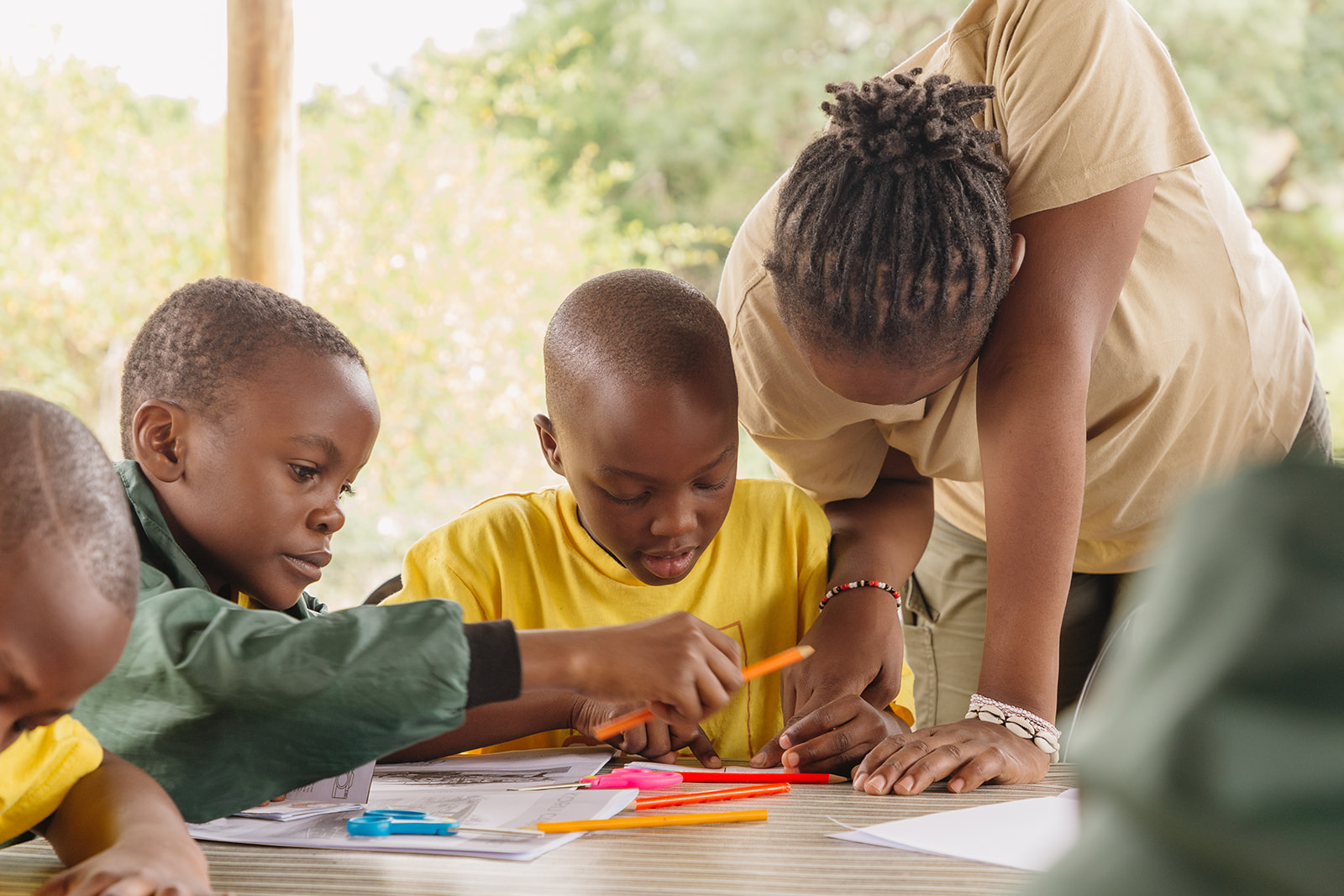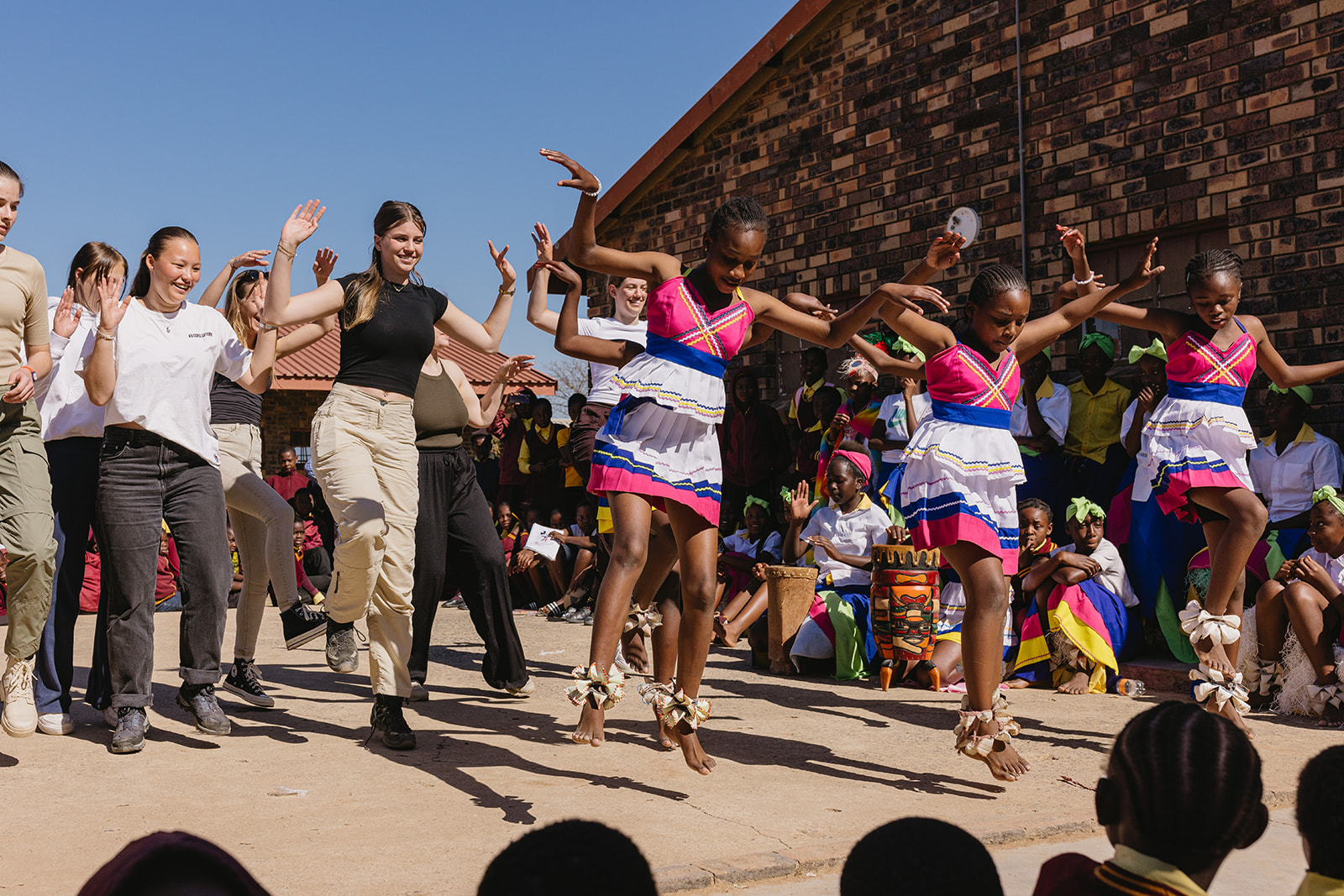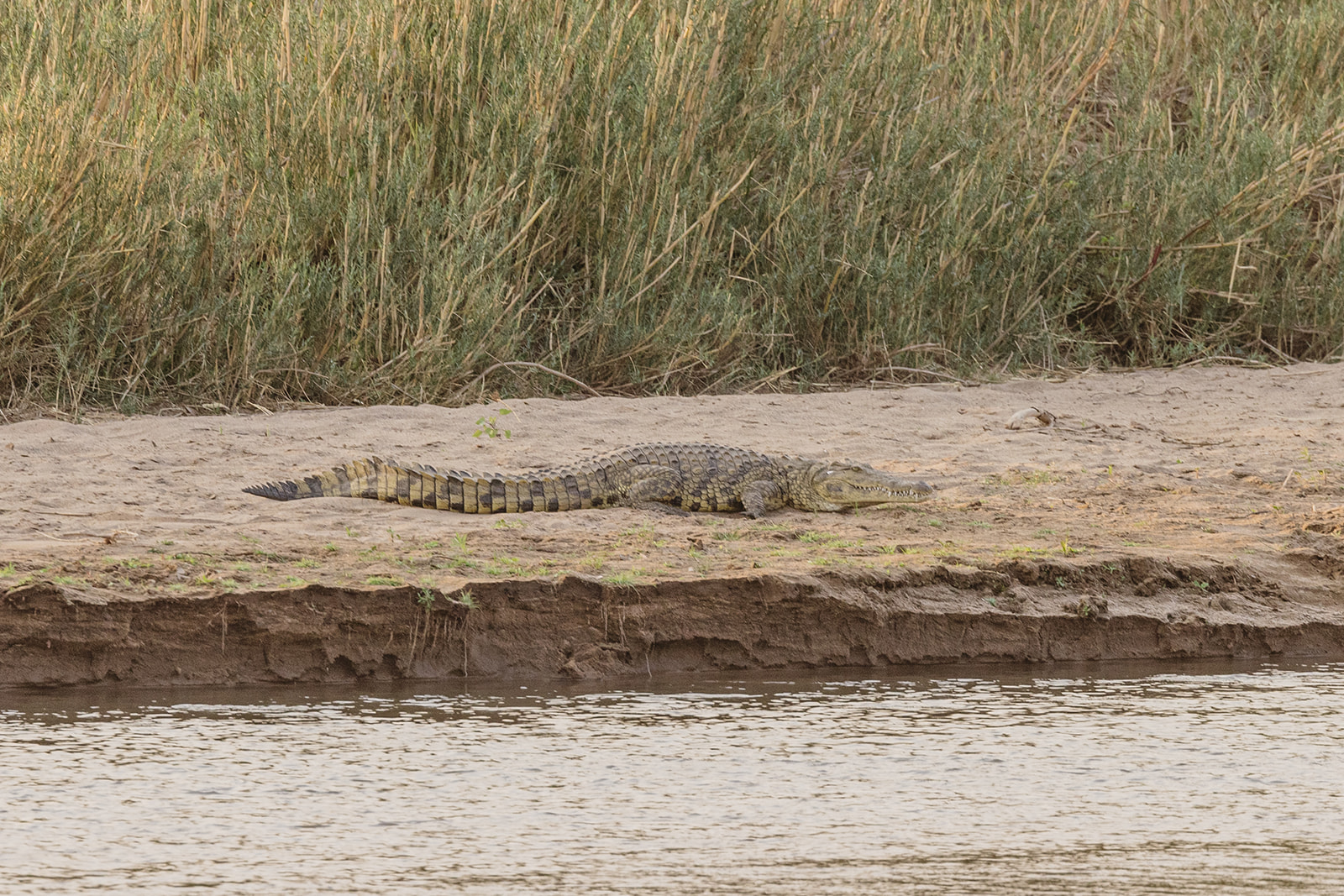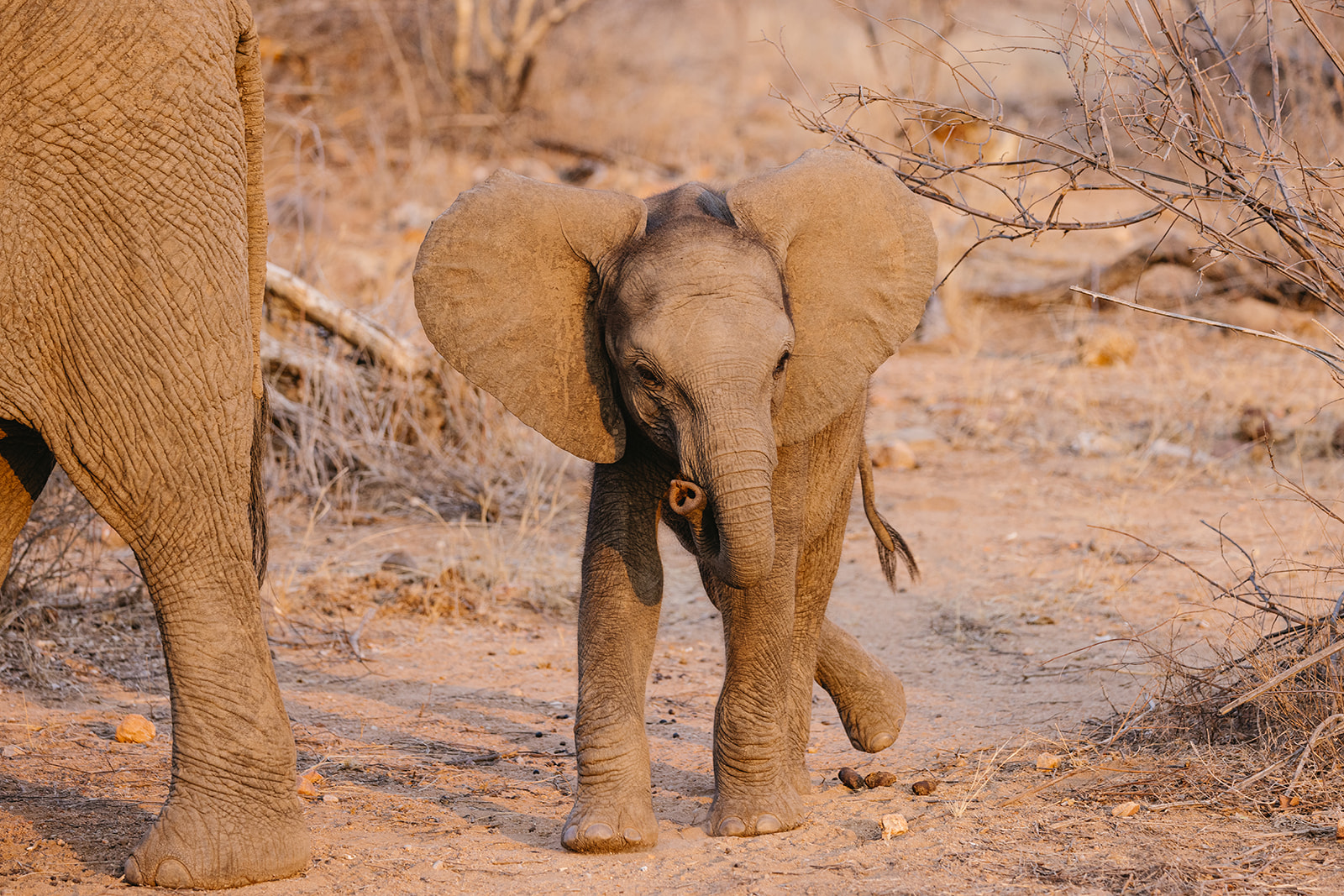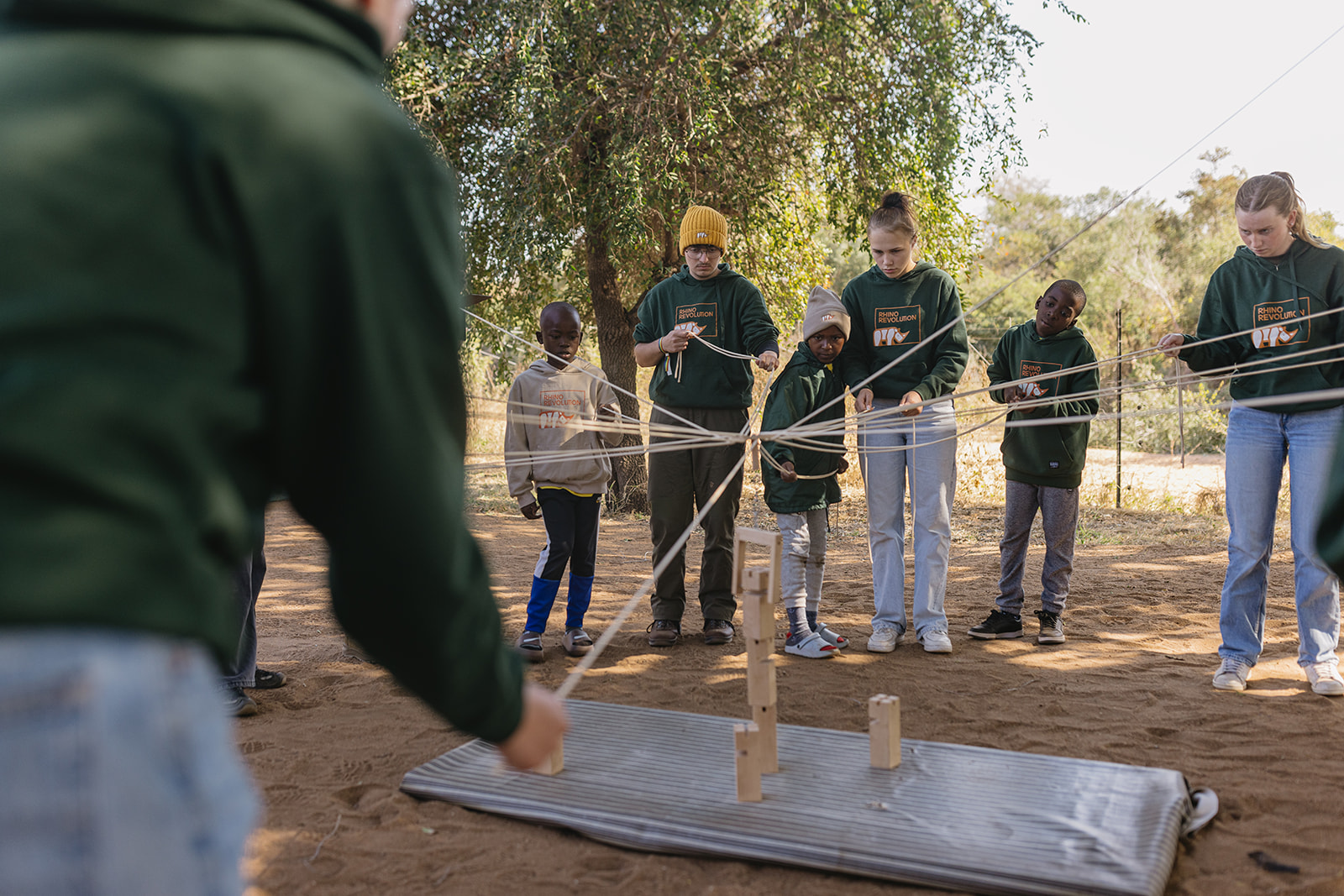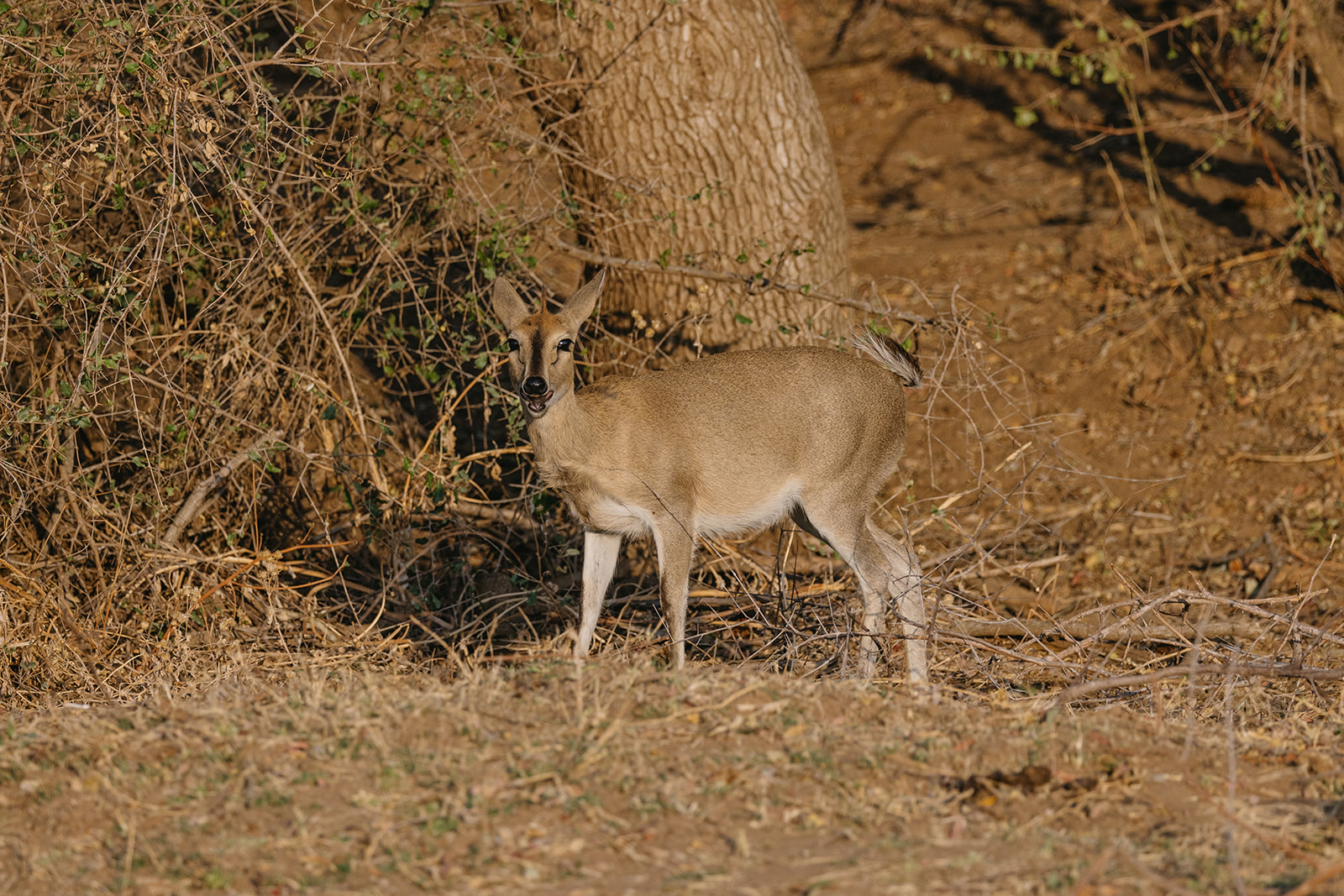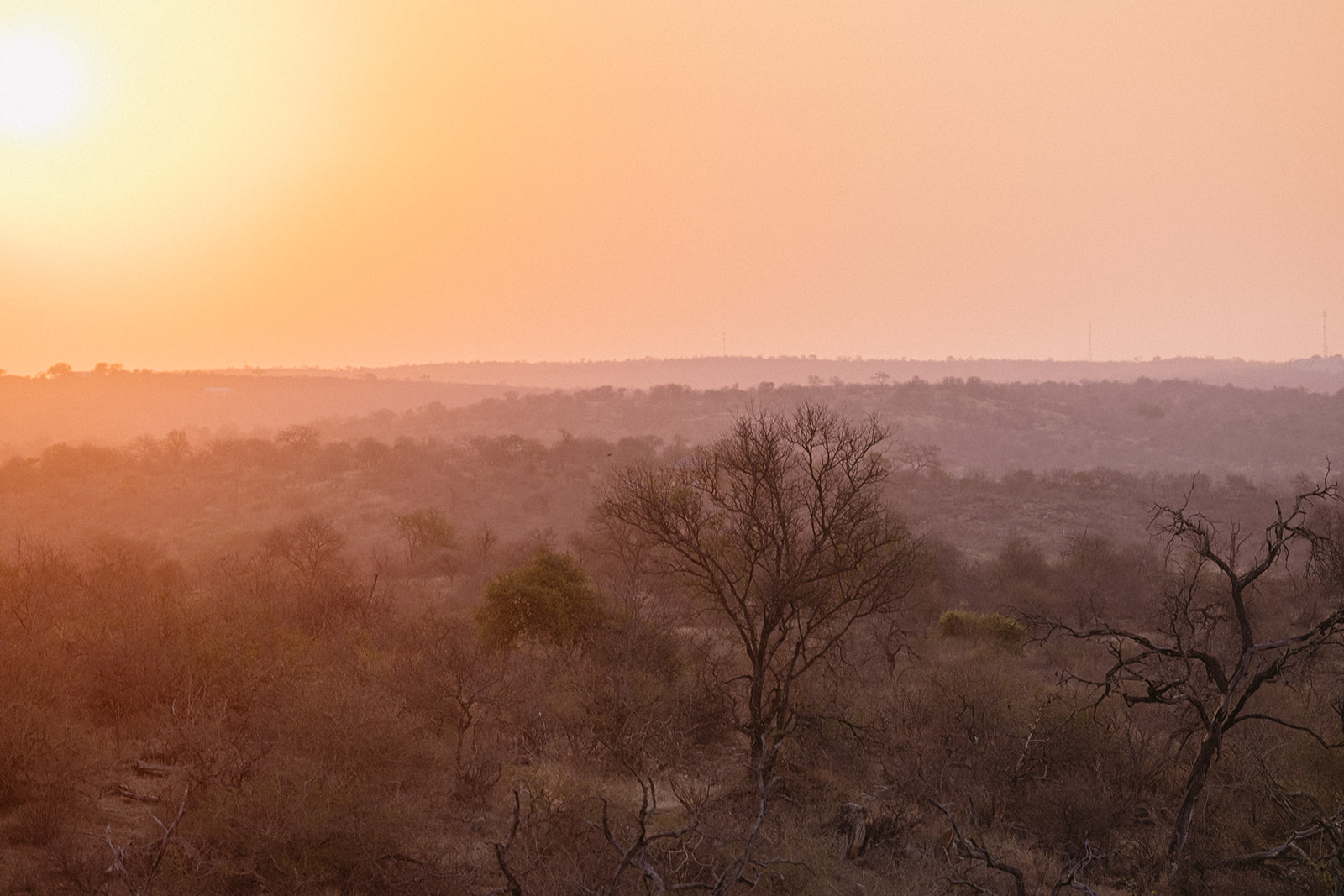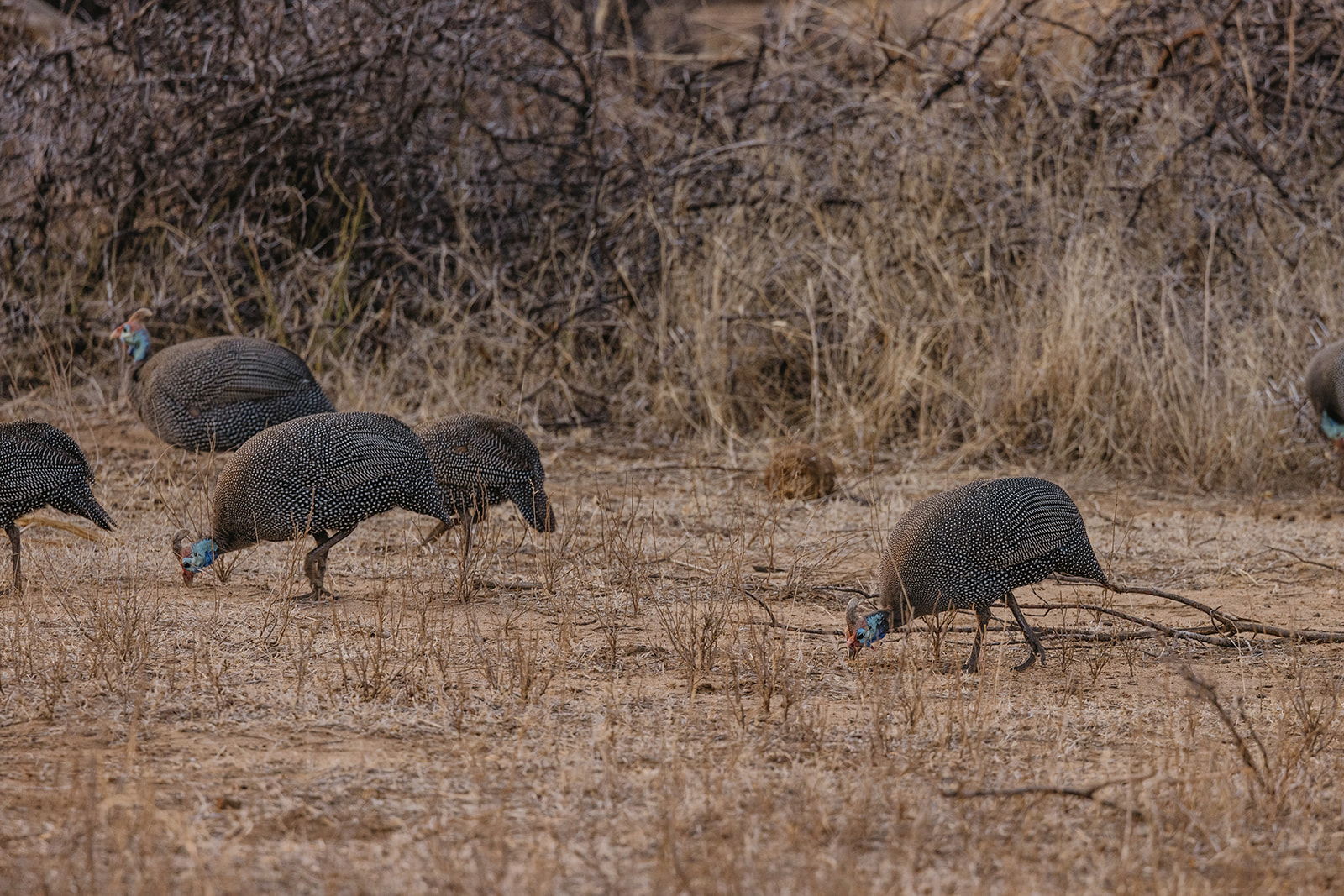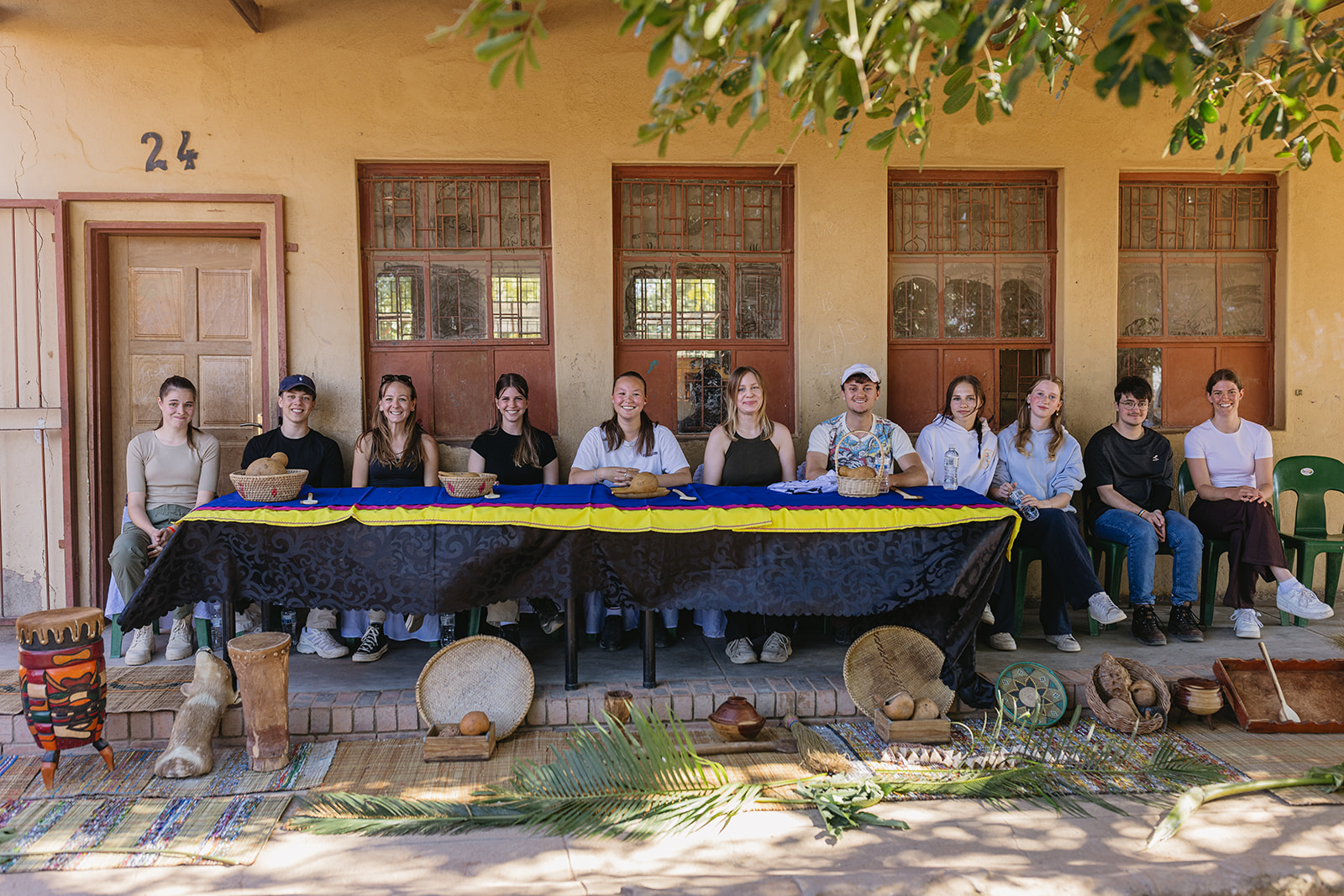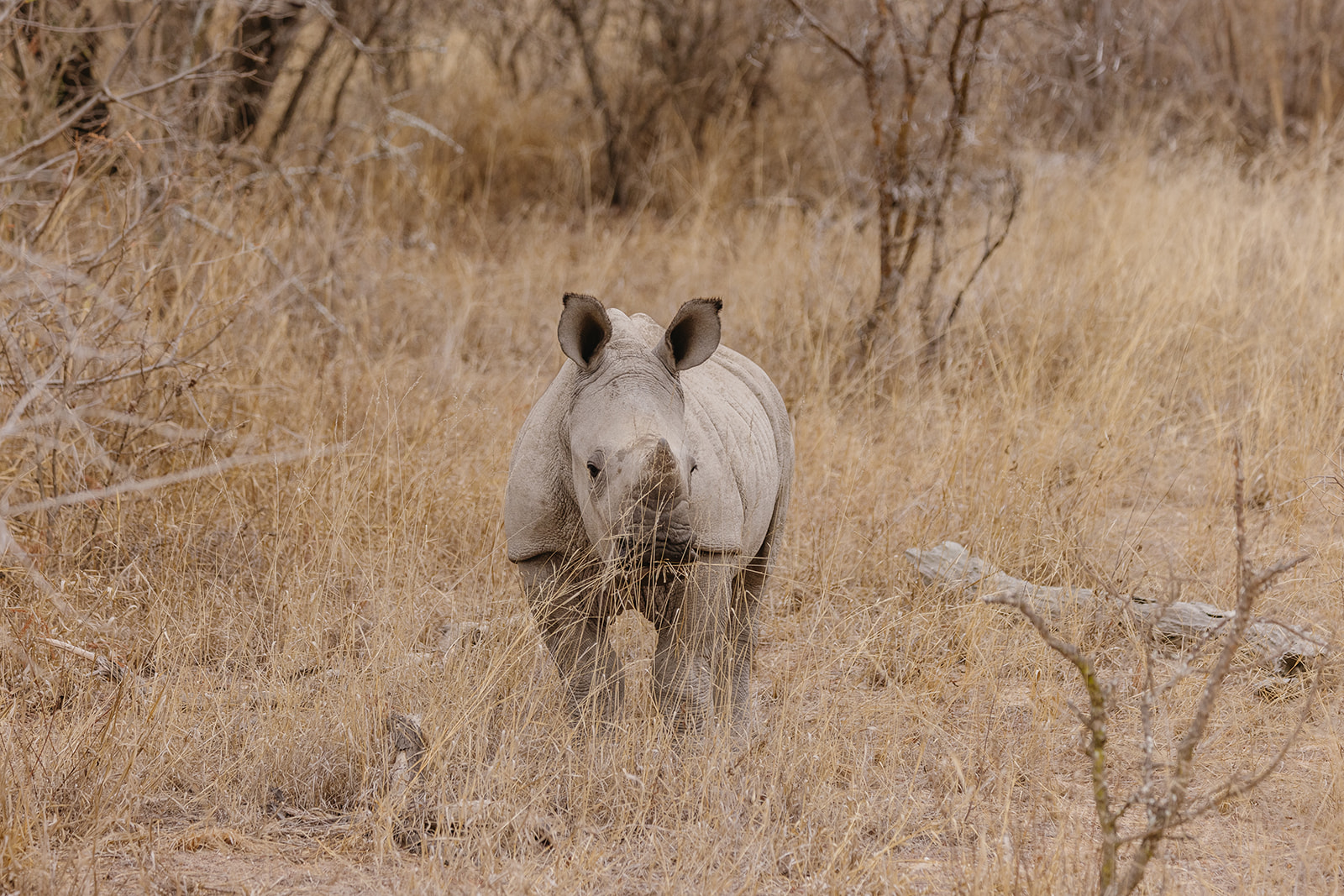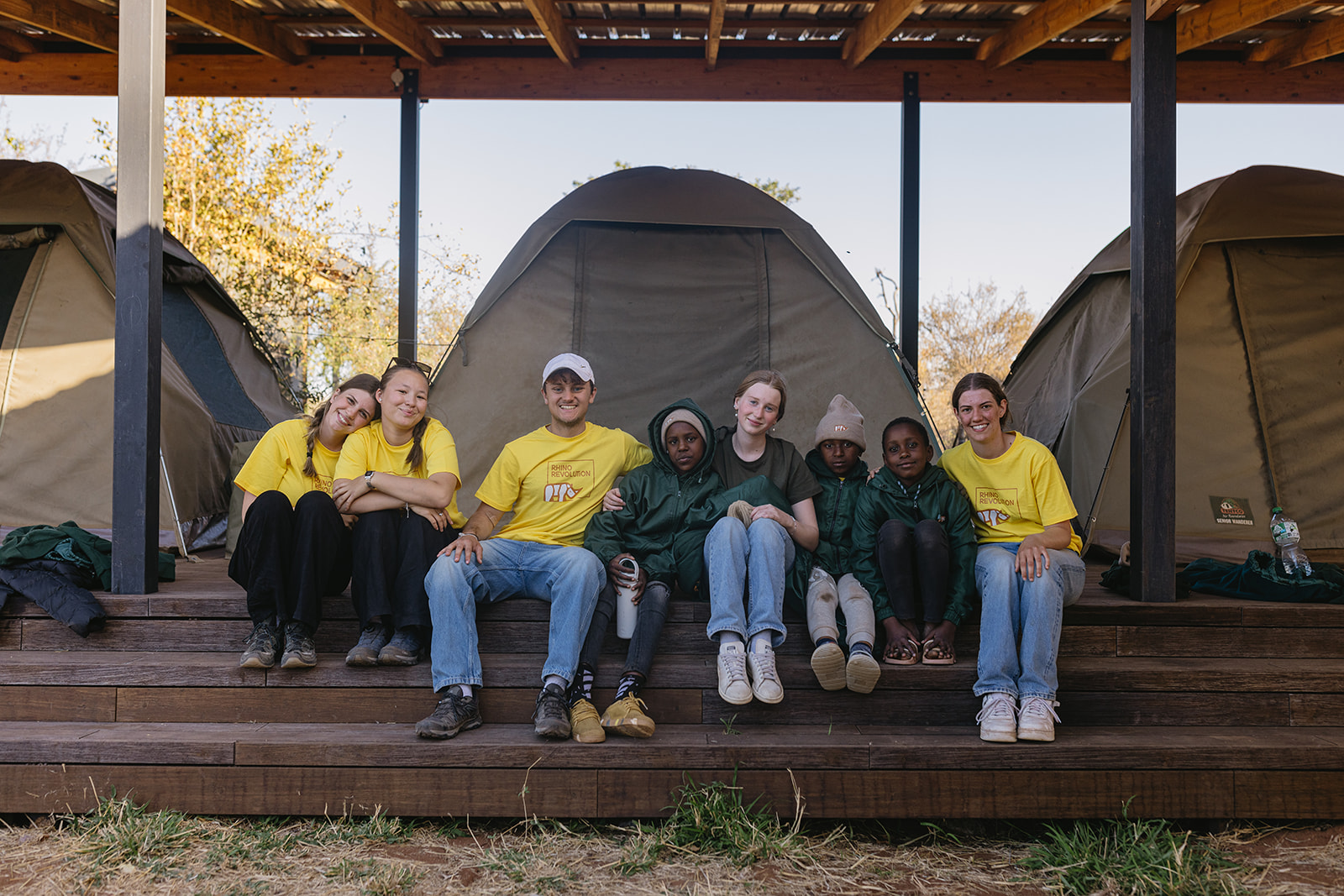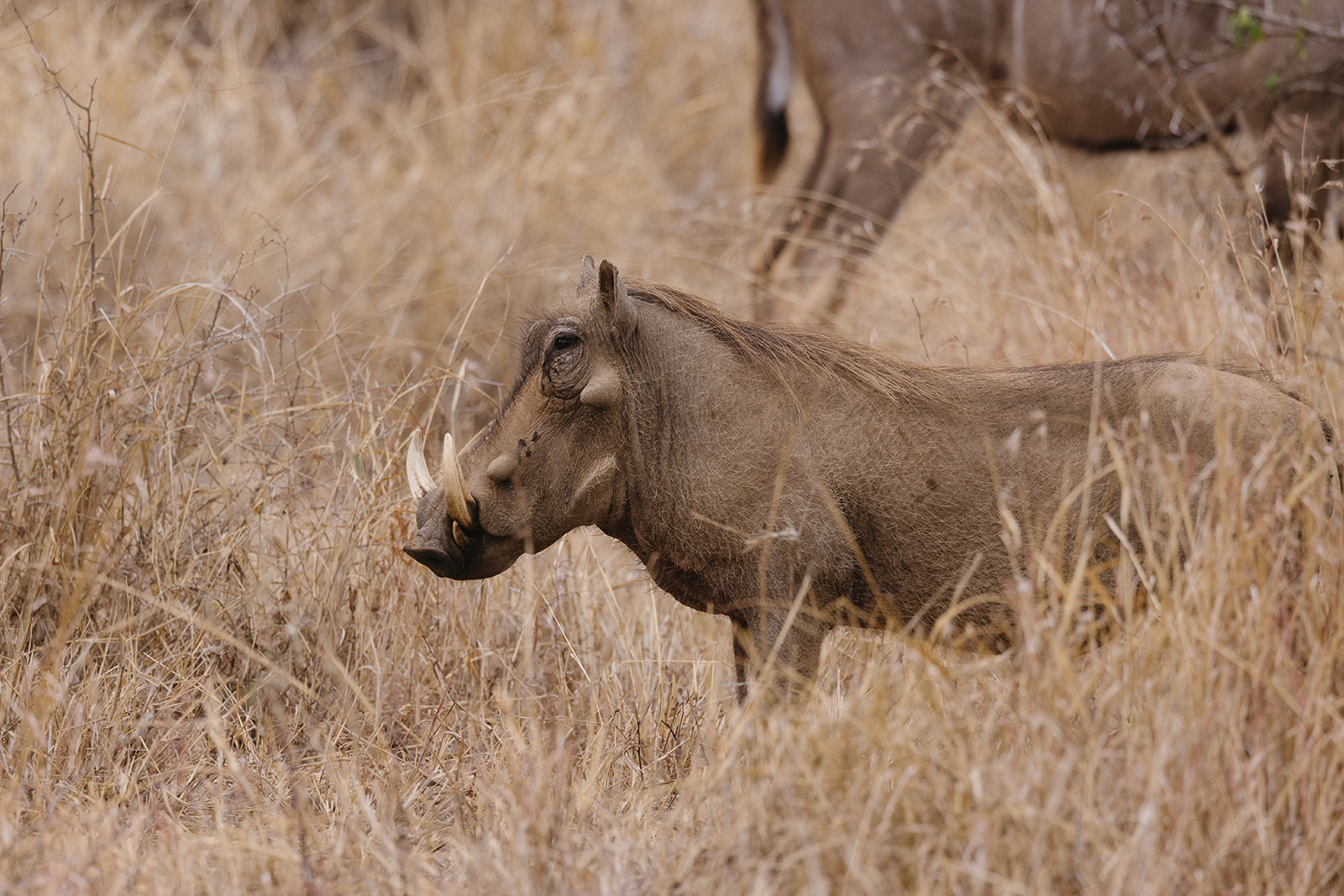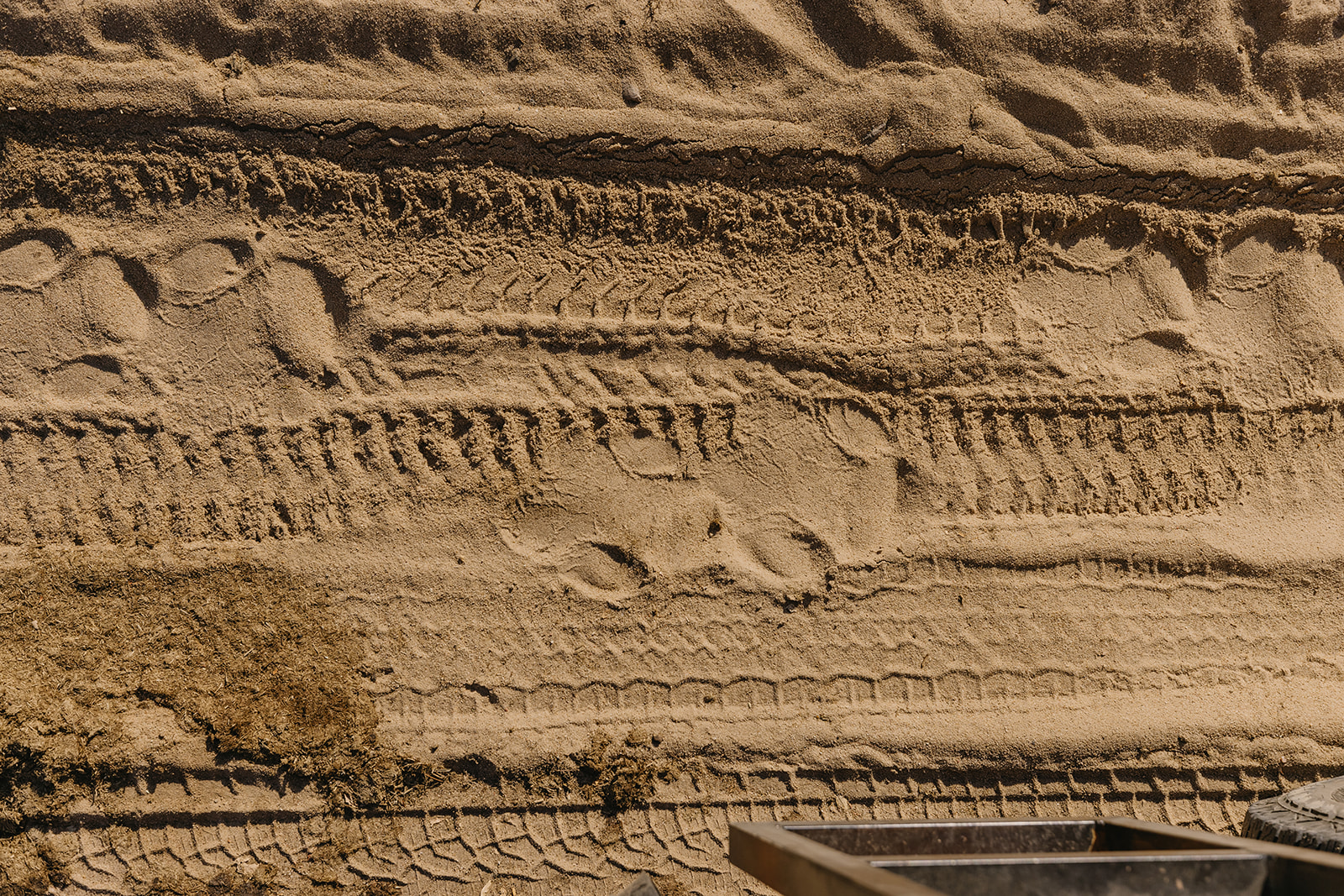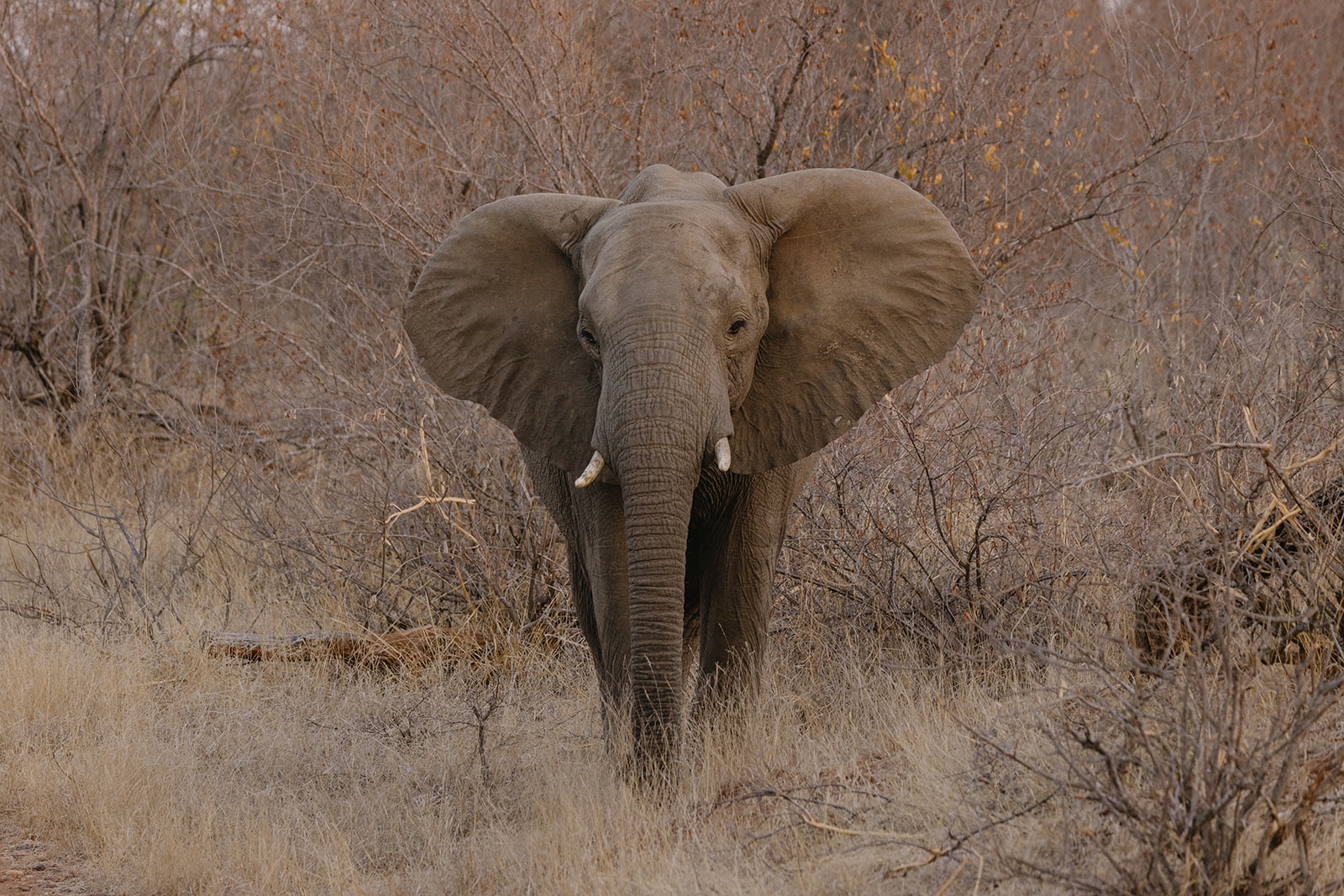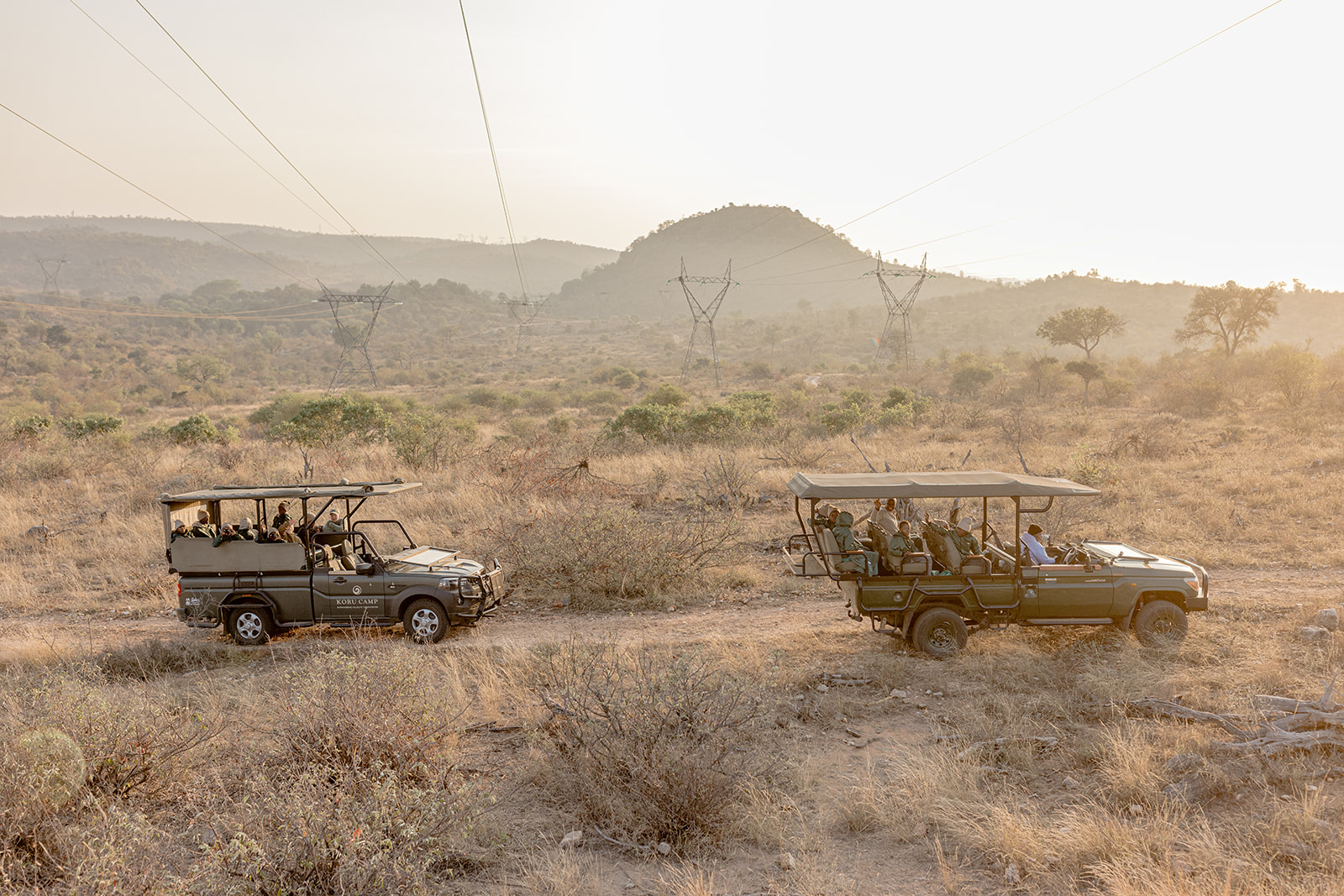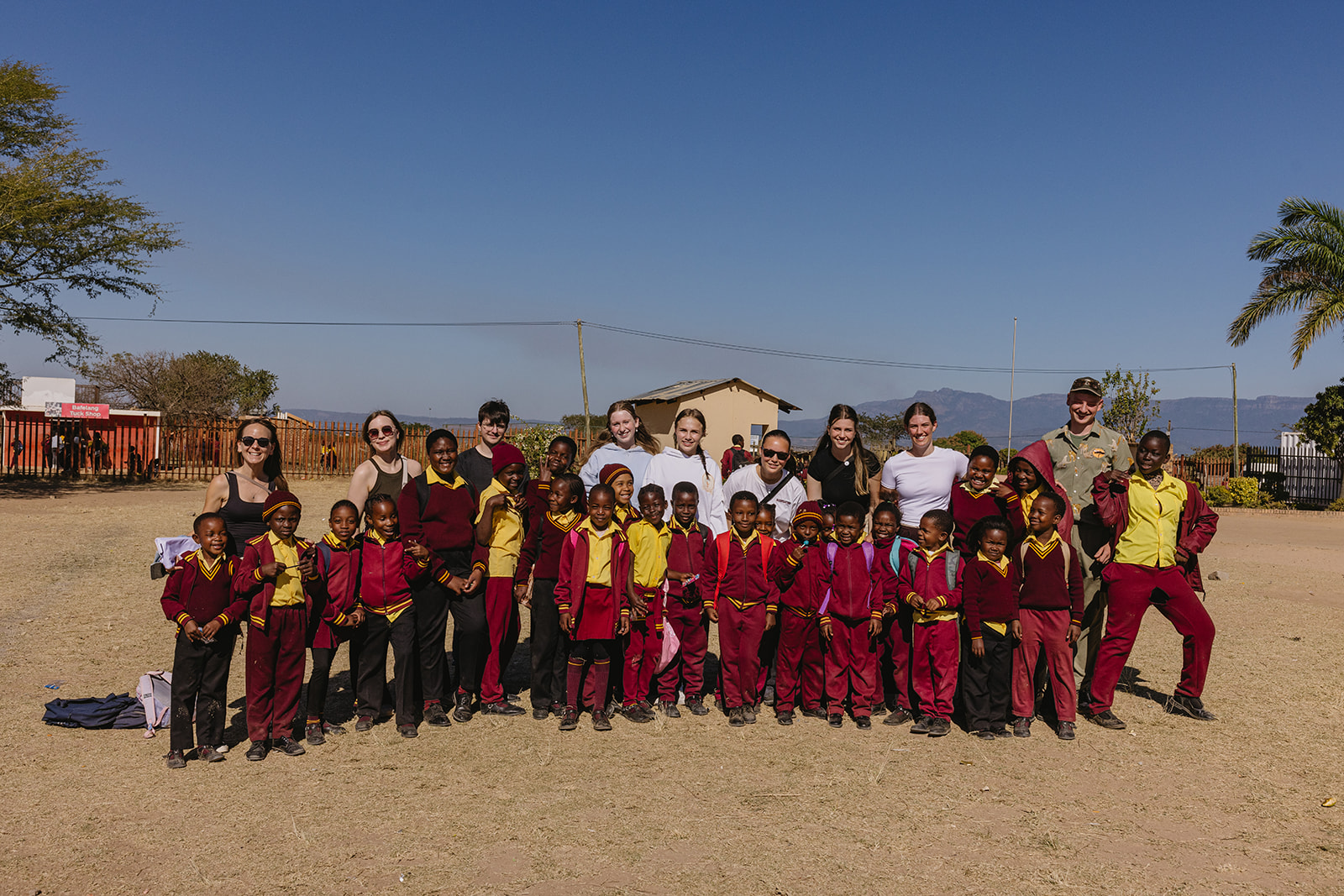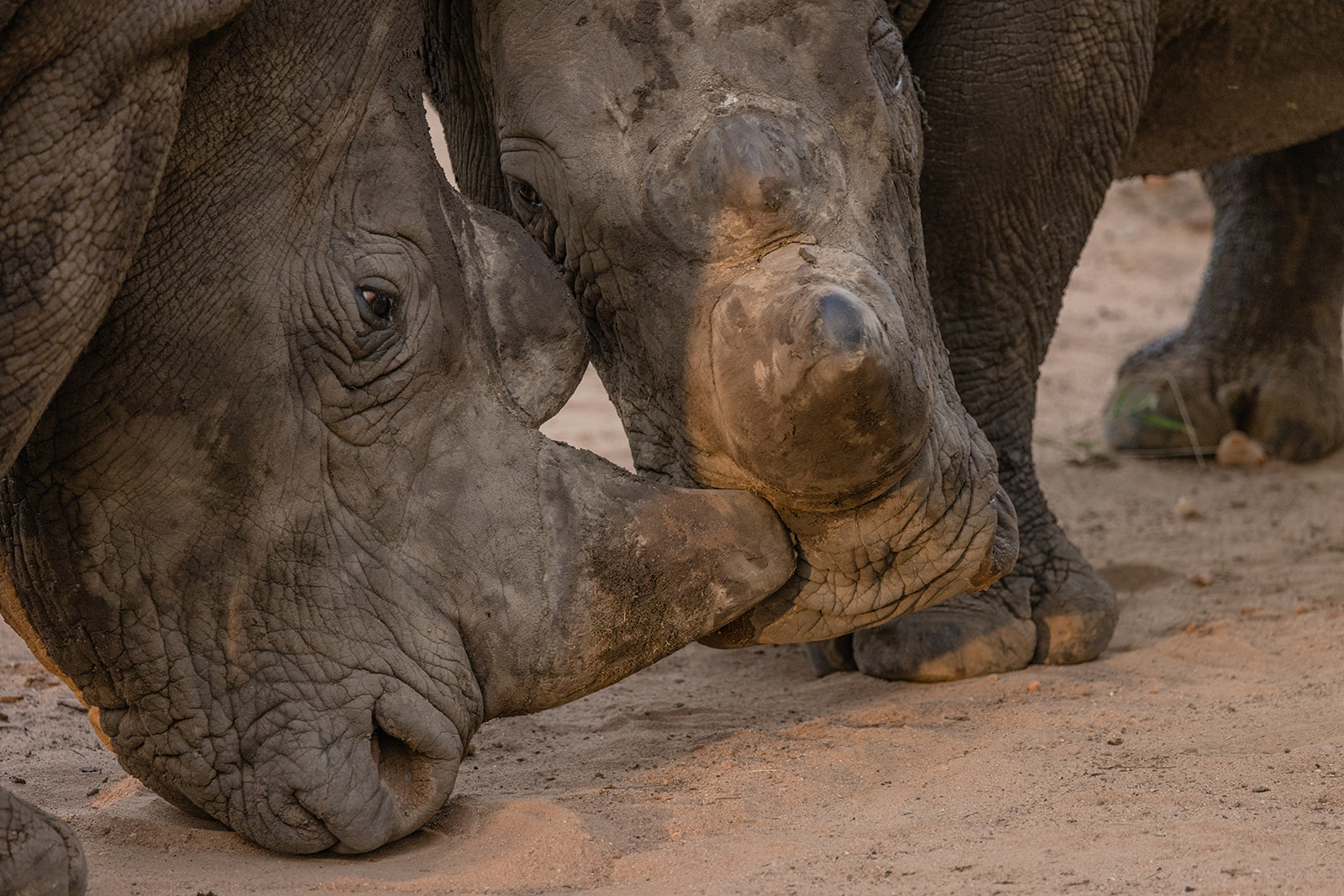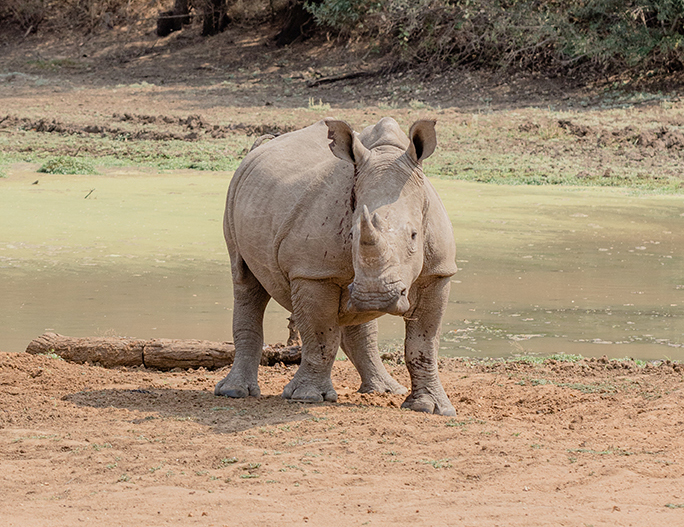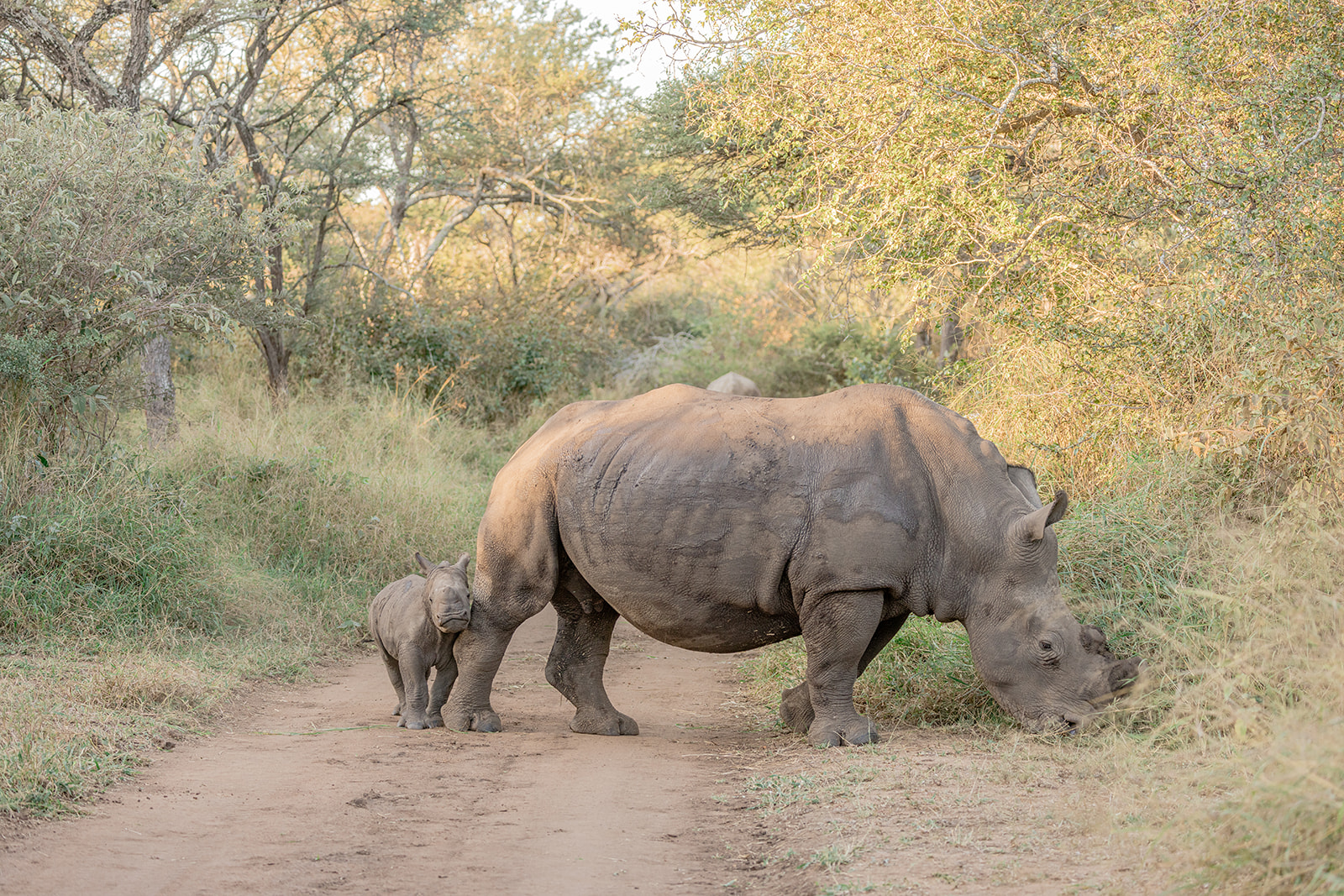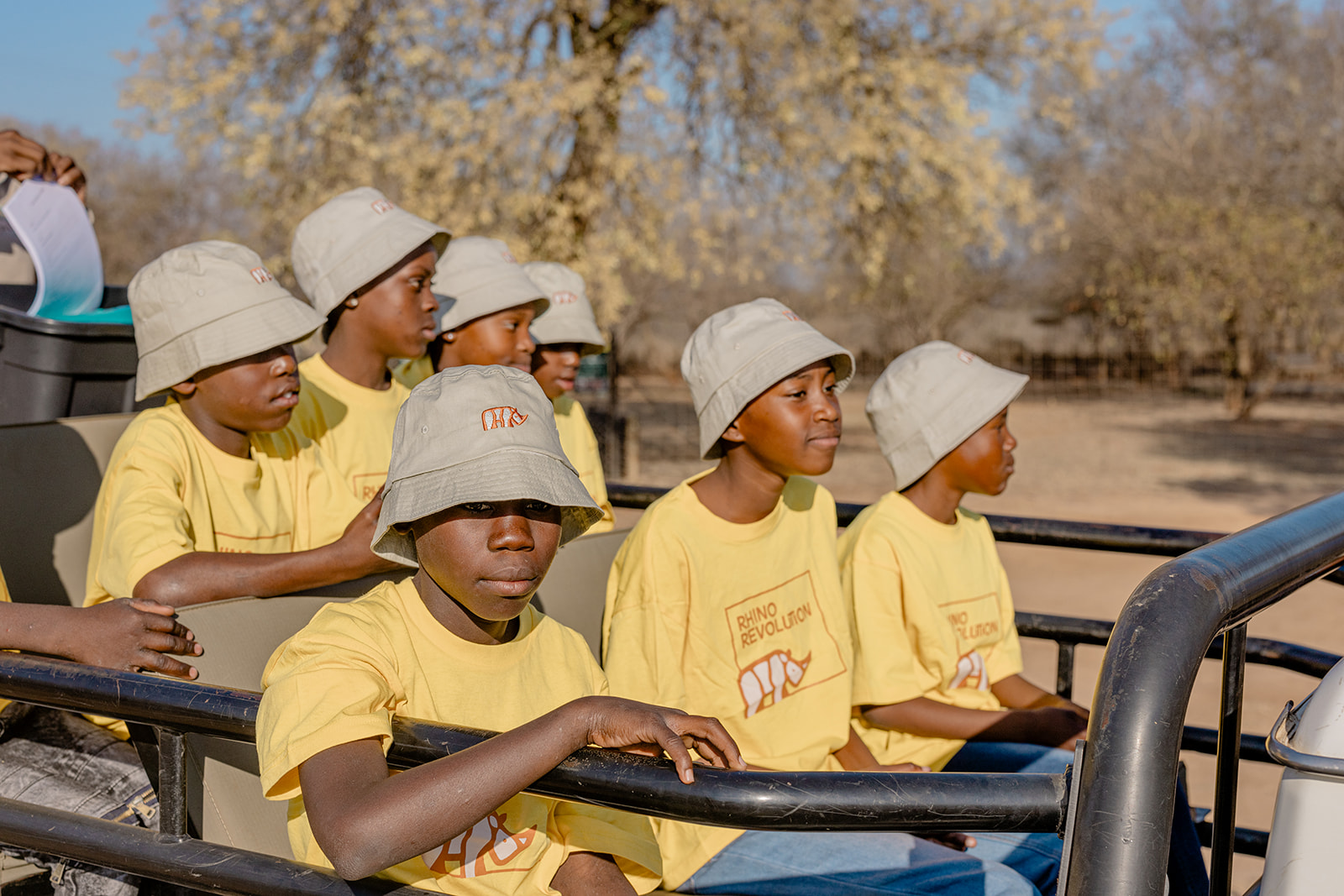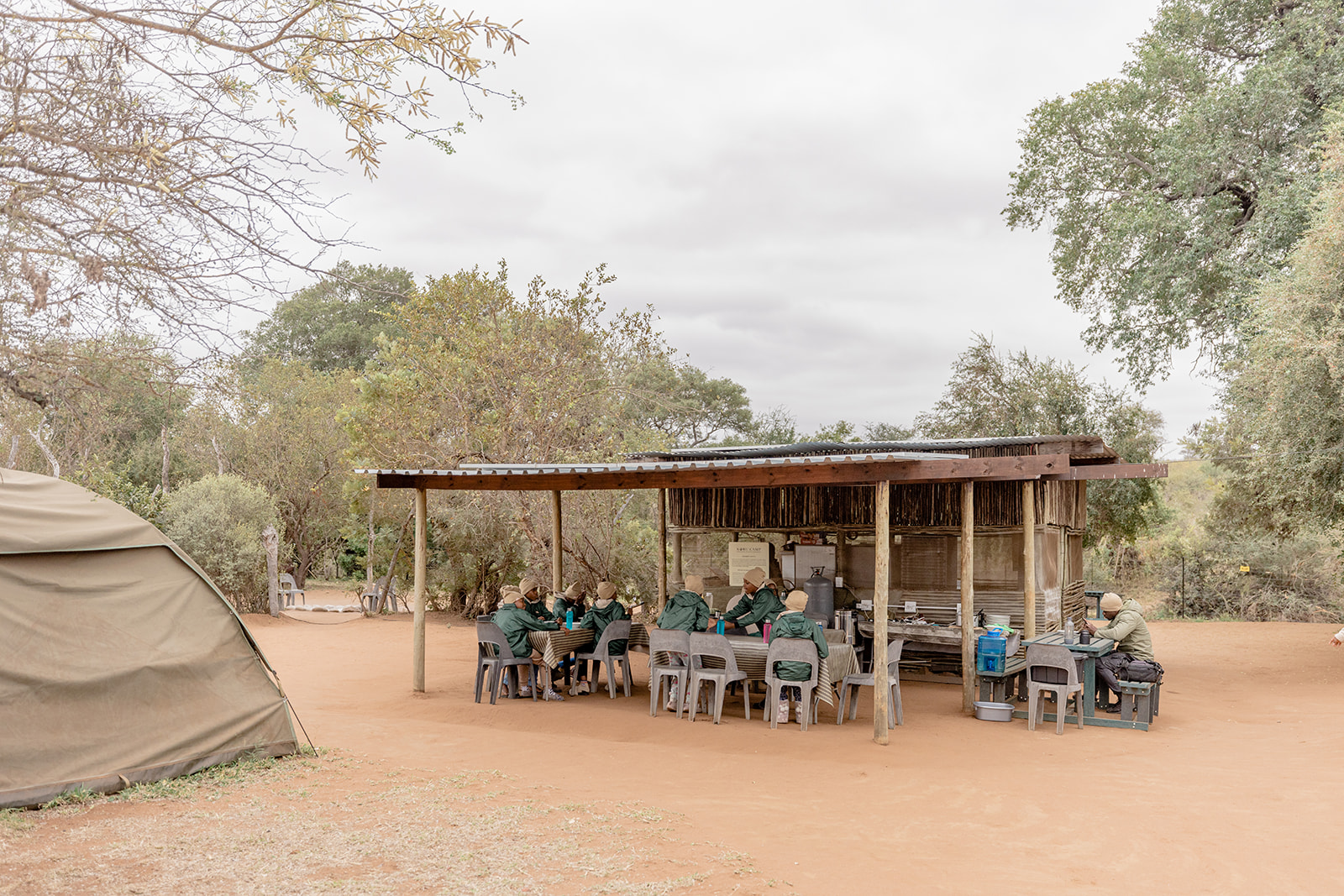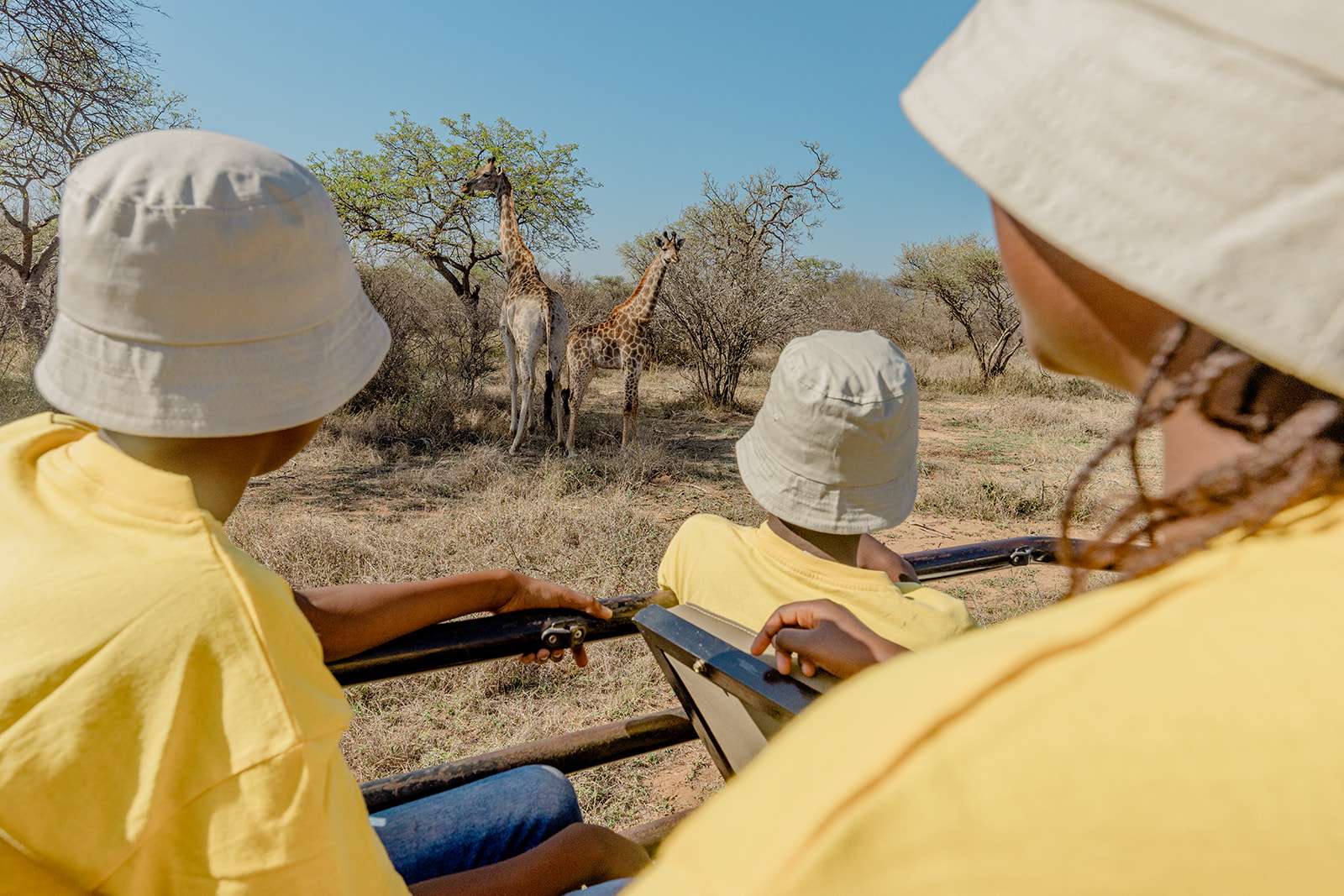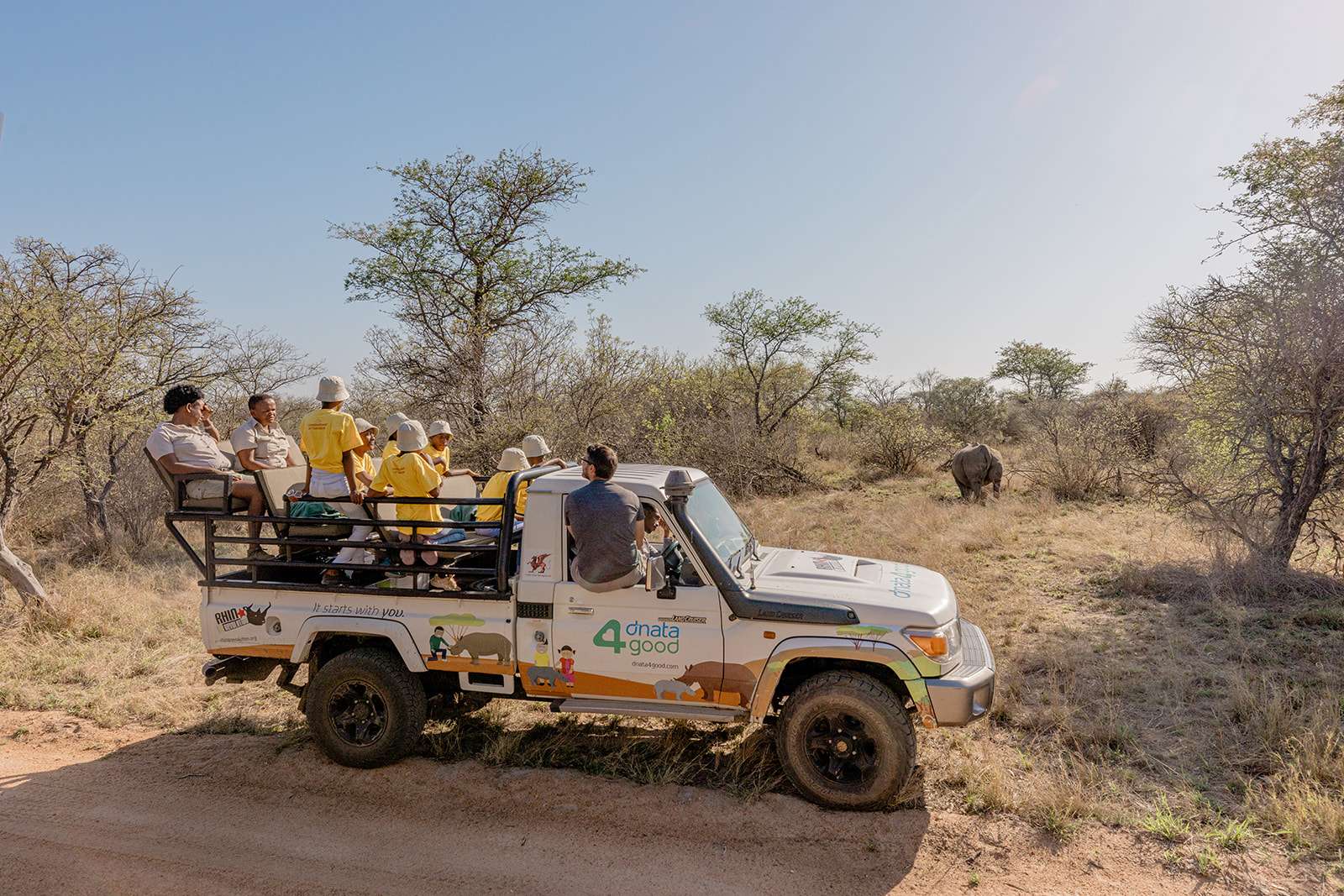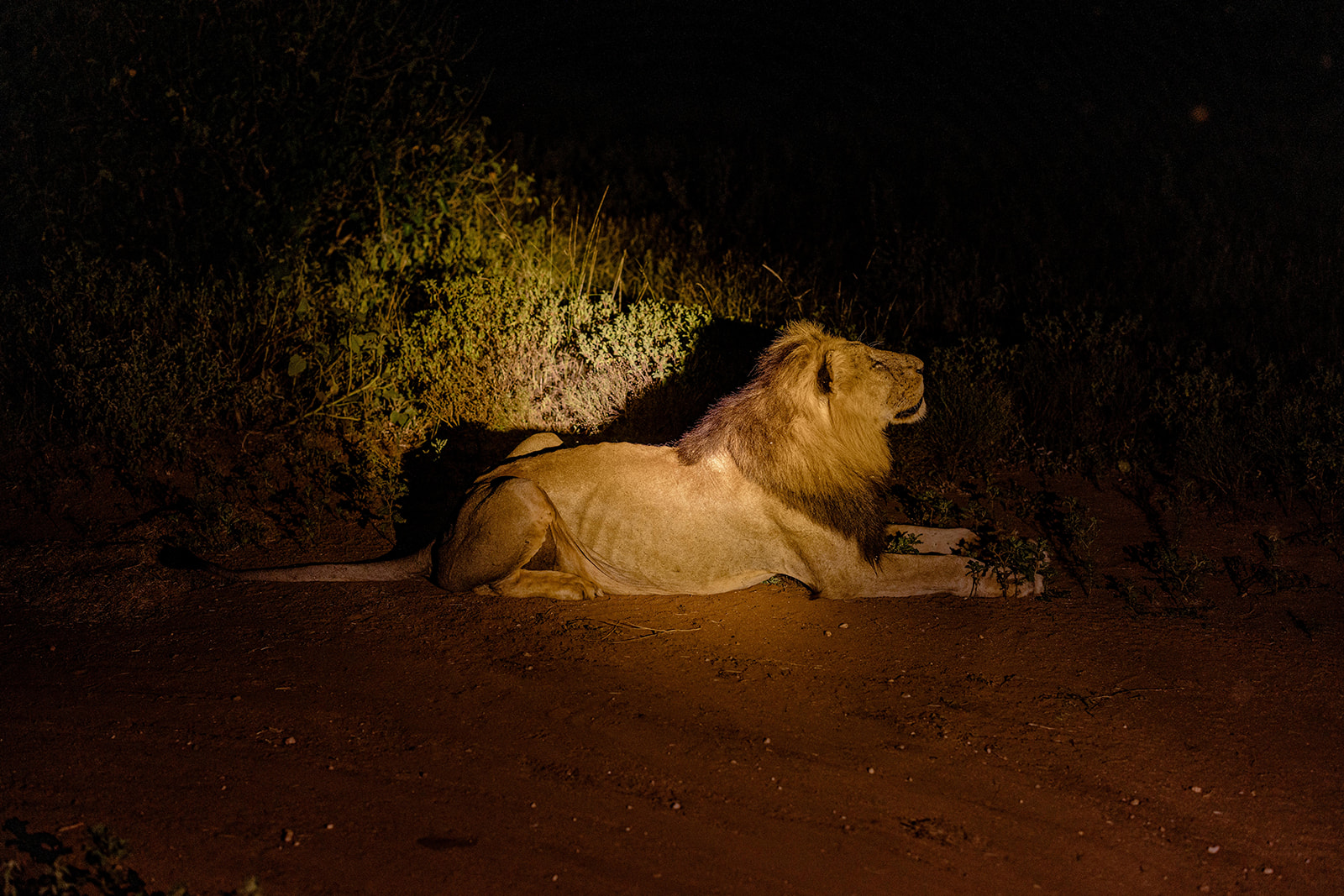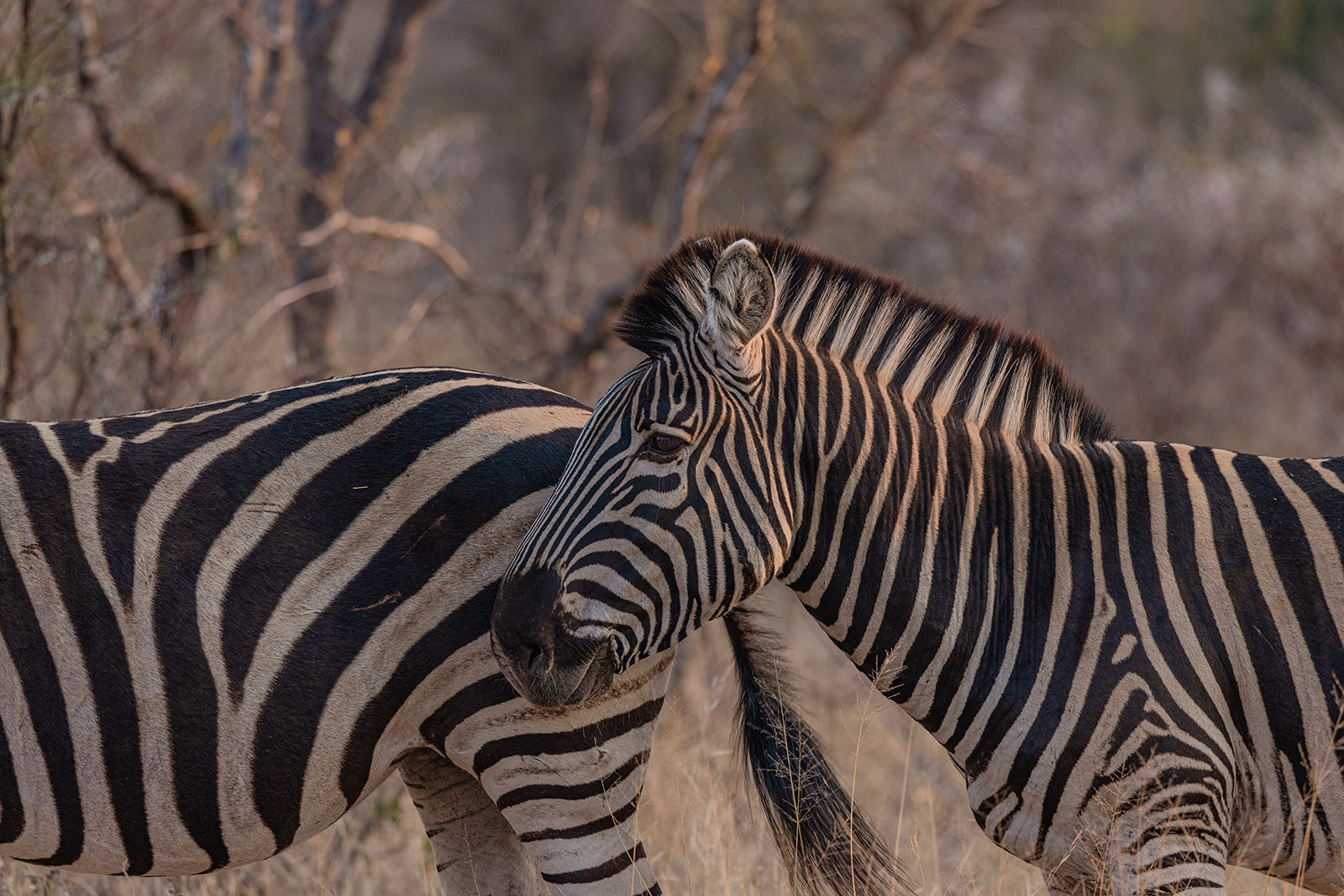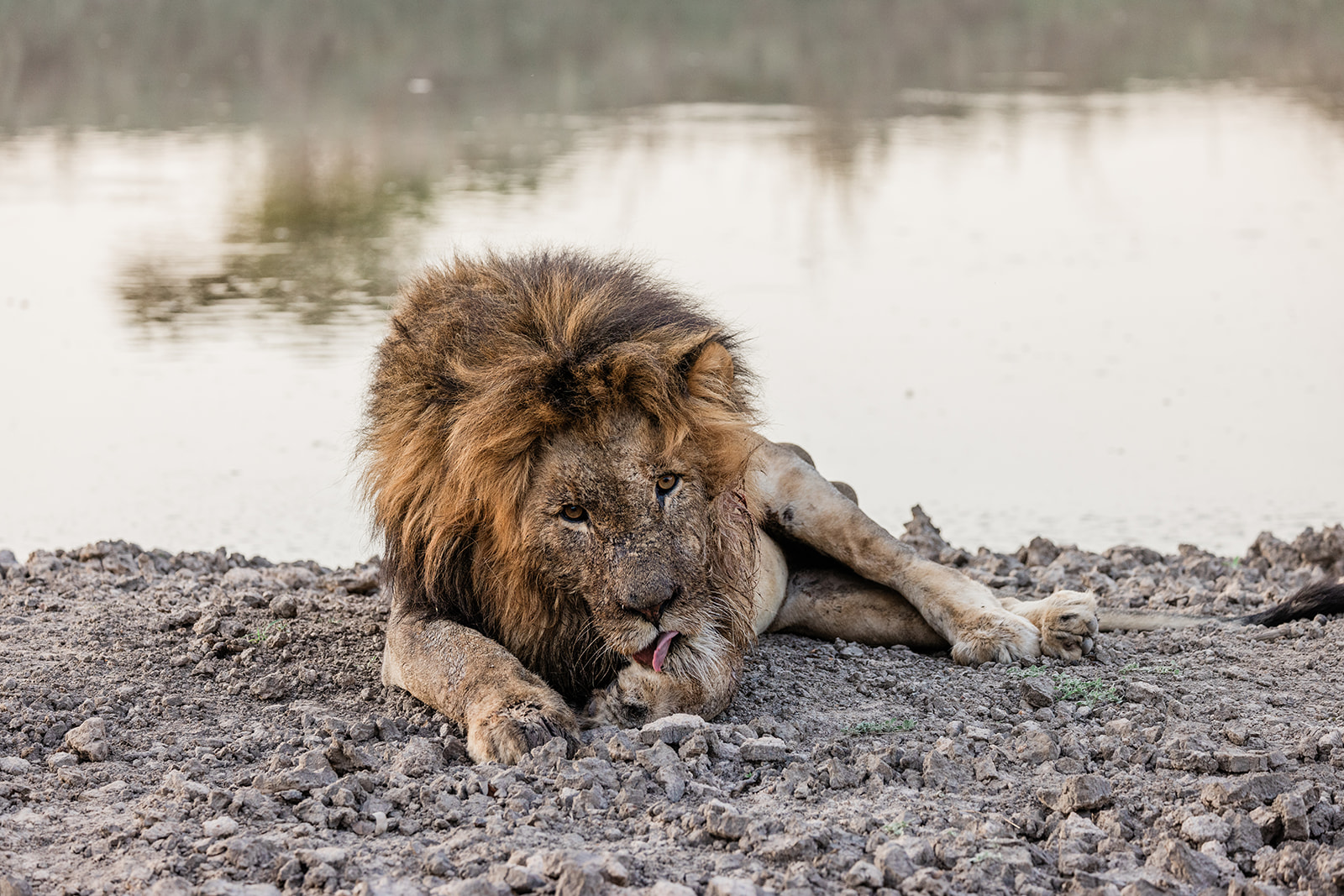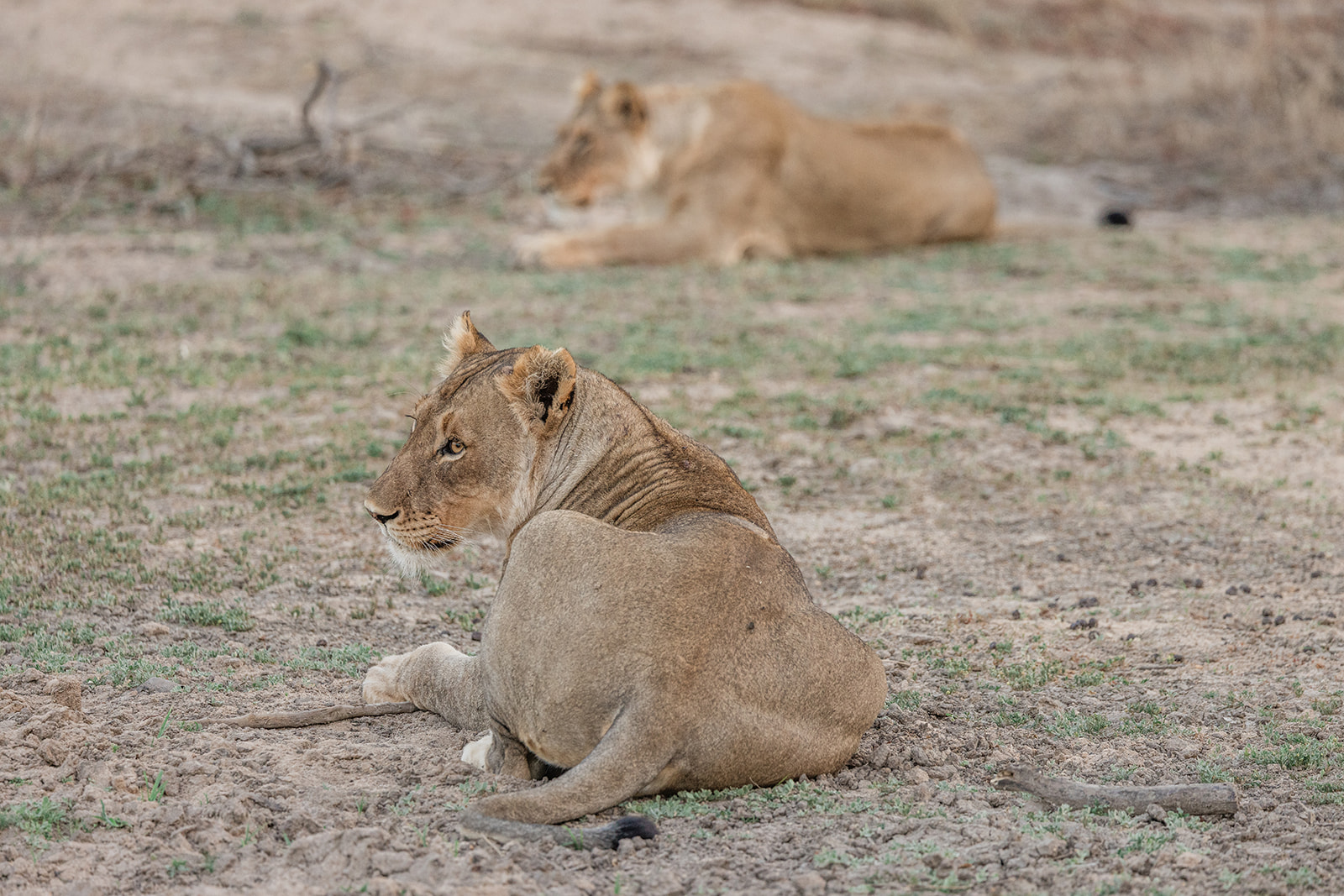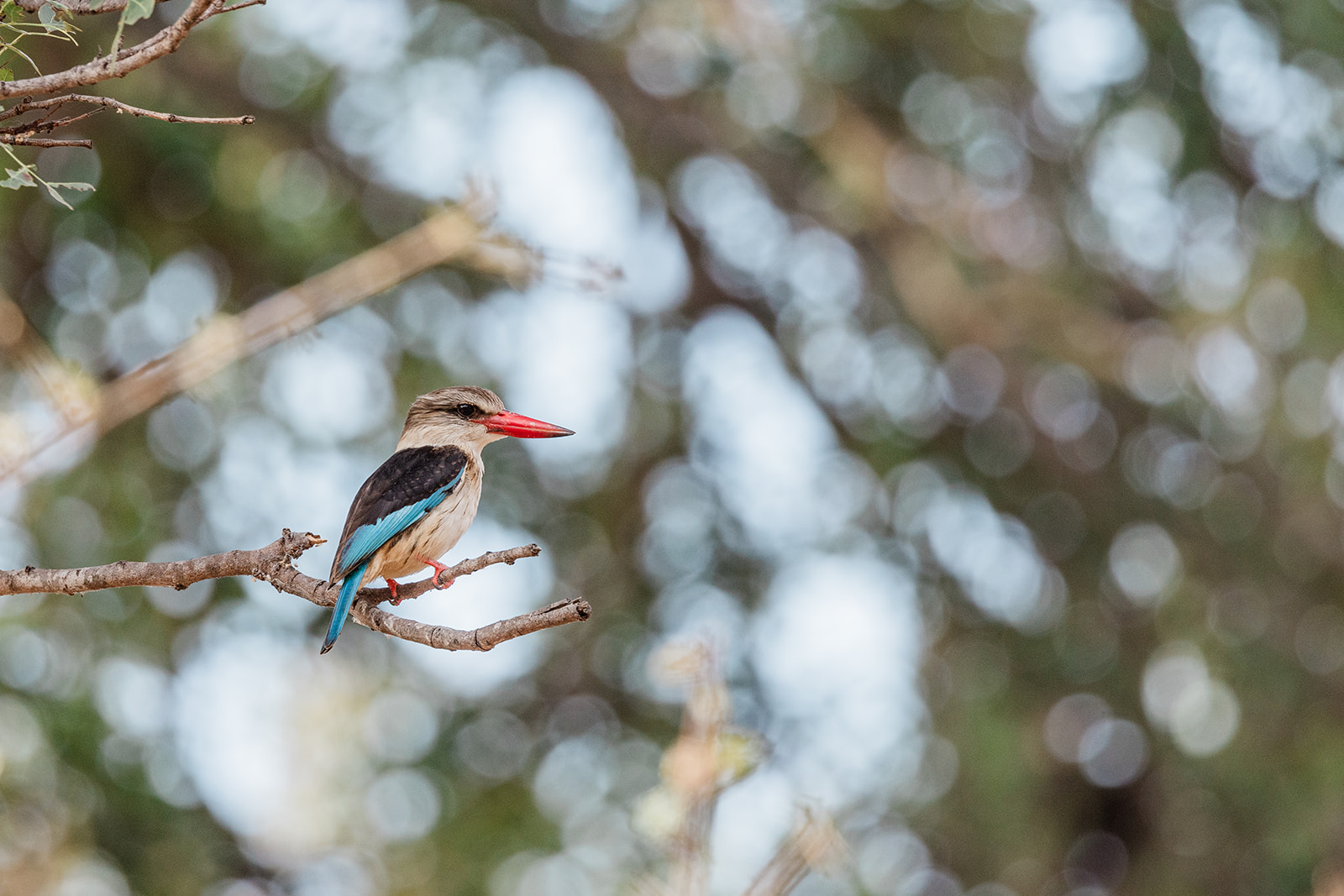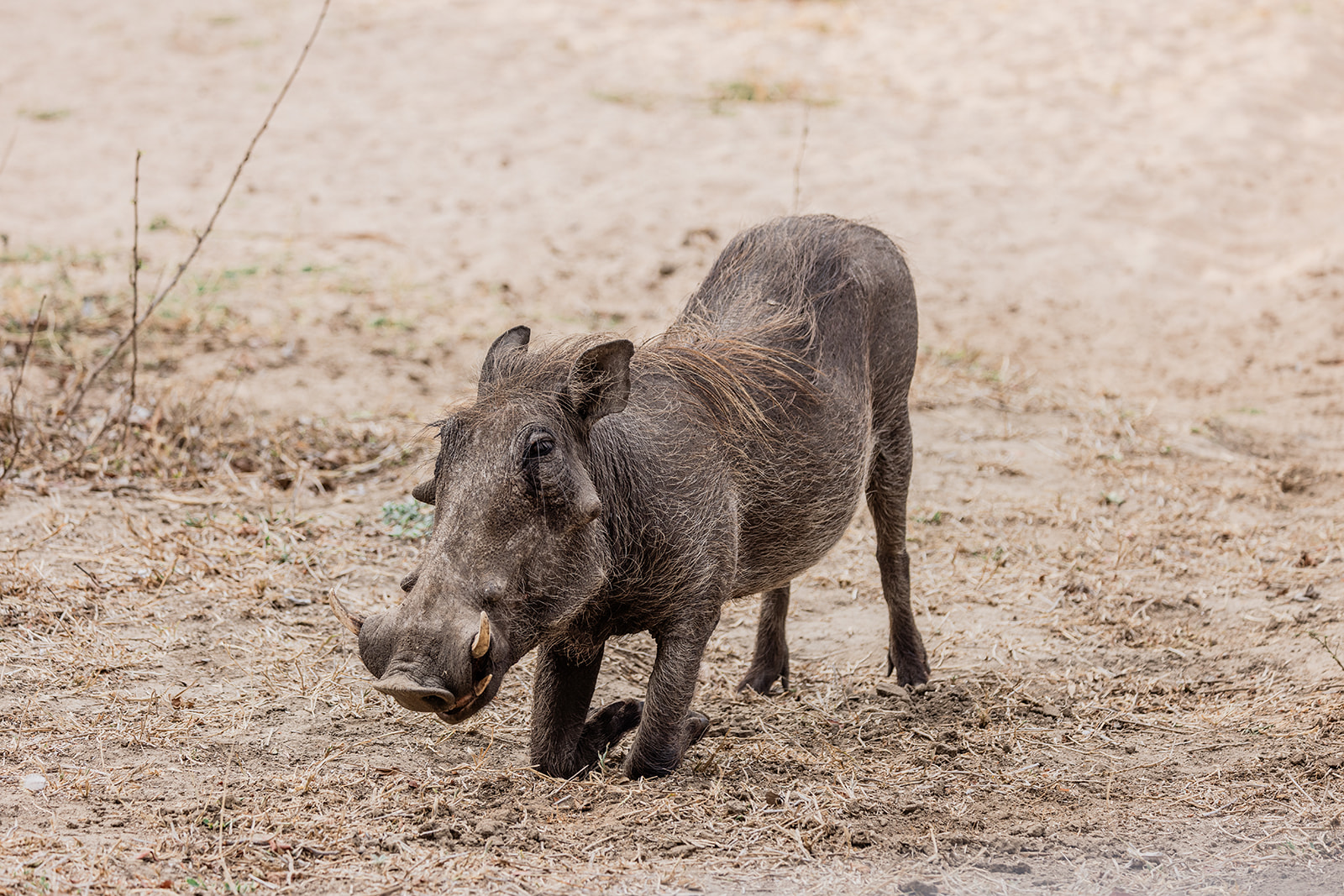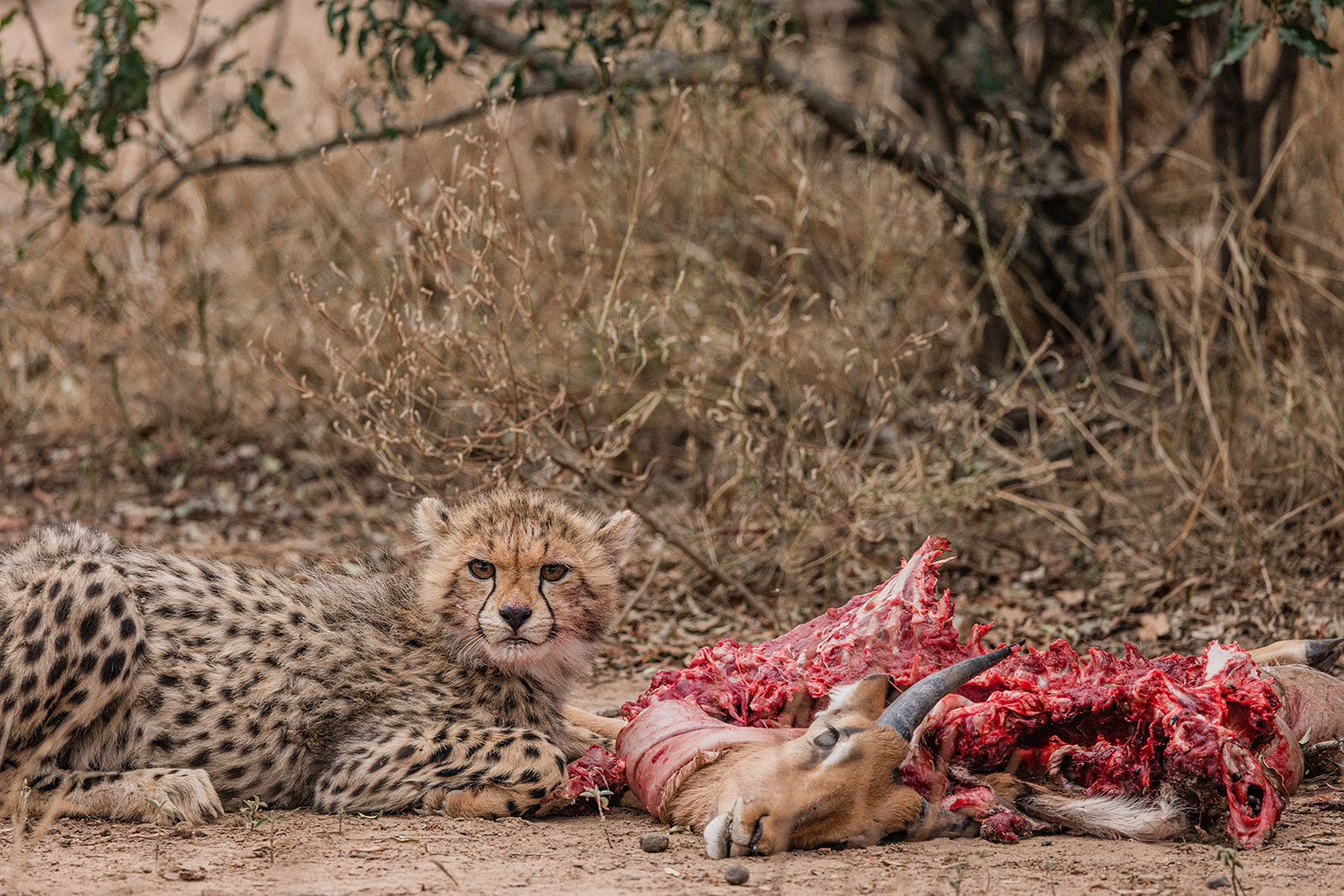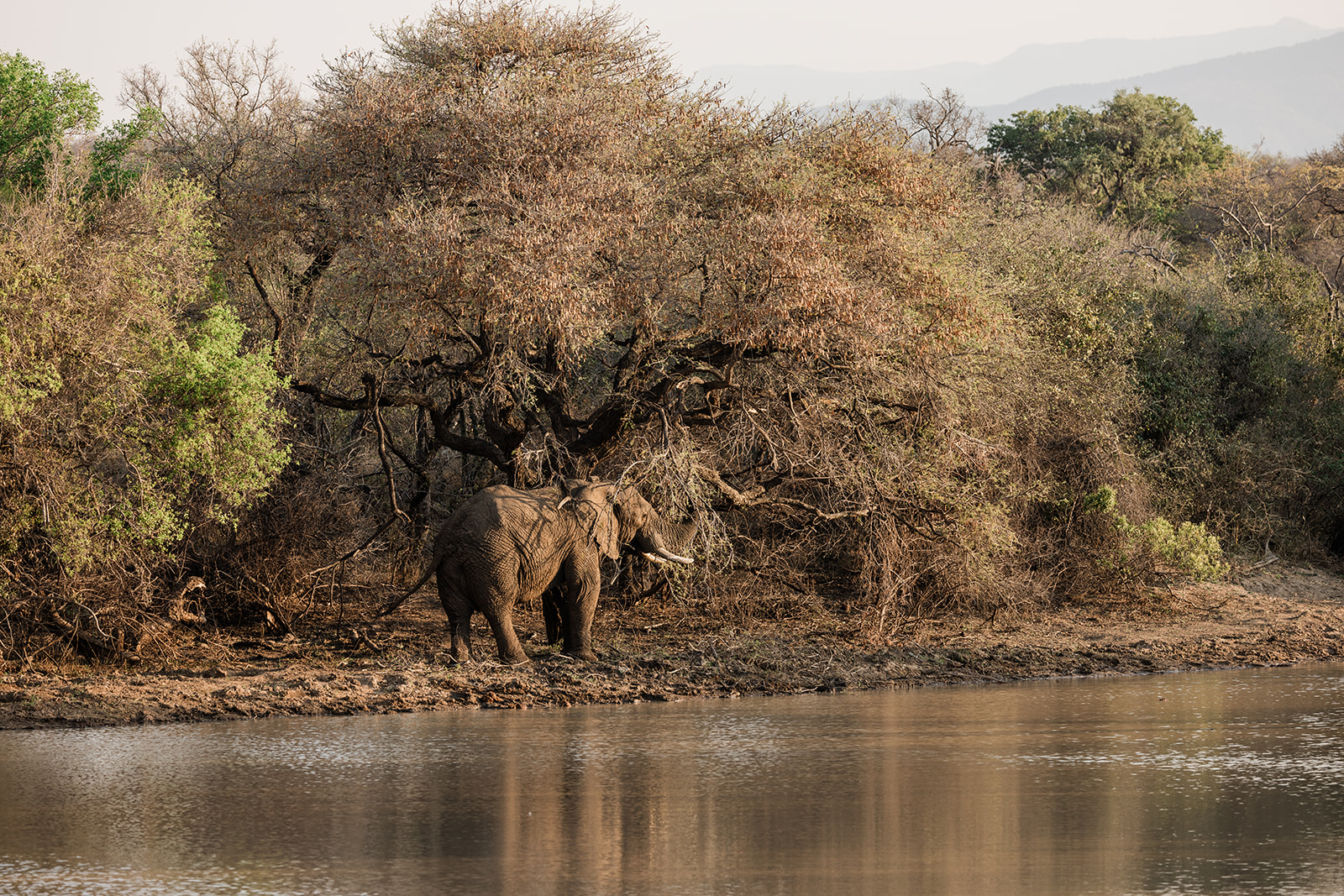
Rhino Revolution Europe is a charitable organisation with a holistic approach to species and environmental conservation. We firmly believe that lasting change is achieved through education. Alongside our active projects protecting rhinos and their habitats, we invest heavily in education and public engagement in South Africa and worldwide.
Our education programmes follow the principles of Education for Sustainable Development (ESD) and contribute to the Sustainable Development Goals (SDGs). This approach also underpins our Culture & Conservation Exchange, which gives young people not only a deep insight into our work but also the chance to take part actively and make a meaningful contribution.
During their stay in our two tented camps, students learn why conservation matters—and put that knowledge into practice. Encounters with wildlife on safari—such as lions, elephants, rhinos and antelopes—clearly demonstrate why protecting these species and their habitats is so important. Participants also join practical conservation activities, for example wildlife monitoring using camera traps and the removal of invasive plant species.
A key focus of the exchange is intercultural learning. In addition to engaging with South Africa’s wildlife, students have a rare opportunity to visit a rural community on the edge of Kruger National Park. They experience everyday life, meet students from Rhino Revolution’s education initiative, and work together on conservation-themed projects that build mutual cultural understanding.
This exchange offers a distinctive blend of environmental action and intercultural connection. It motivates young people to take responsibility for our planet and to recognise their own role in protecting nature and fostering global cooperation.
Important information
The details on this webpage are not legally binding on Rhino Revolution. Due to weather or other unforeseen circumstances, projects and excursions may be postponed, altered or cancelled. The safety of participants and organisers always comes first.
Rhino Revolution works with a range of third-party providers. Depending on group size and travel dates, we will allocate suitable camps and facilities subject to availability. Costs may vary slightly; once we have your confirmed group size and dates, we will provide an individual, tailored quotation aligned to your needs.
To enquire about dates and pricing for the Culture & Conservation Exchange, please email info@rhinorevolution.eu with your preferred travel window, group size and any key questions. We’ll reply shortly with availability and next steps.
If you don’t hear from us within 48 hours, please get back in touch to confirm your message reached us.
For camp life
Clothing
- Daypack for excursions and game drives
- Sleeping bag (bedding provided, but recommended)
- Water bottle (preferably insulated)
- Small notebook & pen for reflections and activities
- Personal medication (please bring enough)
- Passport + copy of passport
- Copy of travel insurance & emergency contacts
- Plug adaptor for South Africa (Type M)
- Charging cables / power bank
- Camera or smartphone (for photos)
(→ Note: limited signal in the bush)
- Comfortable, layered clothing
(layers: T-shirt + jumper + jacket) - Warm jacket/fleece
(mornings & evenings can be very cold) - Long trousers (also for mosquito protection)
- Shorts / lightweight clothing for warm midday temperatures
- Head covering (e.g., sun hat or cap – sun protection!)
- Warm woolly hat & scarf for safaris on an open game viewer
- Comfortable shoes for walks & activities (e.g., trainers)
- Flip-flops or sandals for camp or the shower
- Pyjamas / sleepwear (pack warm here too)
Optional / personal items
Sun protection & personal kit
- Travel reading or a pack of cards
- Some cash in South African rand (ZAR)
- A credit card or prepaid card (if needed)
→ For personal purchases during town visits or snacks on the go
- Sunglasses
- High-SPF sun cream (important even in winter)
- Lip balm with UV protection
- Insect repellent / mosquito spray
- Torch / head torch (for evenings in camp)
- Wash bag with toiletries (toothbrush, shower gel, etc.)
Safari Camp
Community Camp
The Community Camp is located outside Hoedspruit. This region is home to the Big Five and many other savannah species, notably elephants, antelopes, crocodiles and warthogs.
Students are accommodated in rooms for 2–3 people(some twin rooms; some triples), each with an en-suite bathroom featuring a shower, washbasin and toilet. At the centre of the camp is a covered area used for lessons and meals. During the stay, meals are prepared by the kitchen staff. The camp is secured by an electric fence for added safety. From this base, morning and evening game drives depart daily, giving participants the opportunity to explore the area’s rich wildlife and gain valuable experience in nature.
The safari camp is located in an exclusive private reserve in Hoedspruit covering 5,600 hectares and home to the impressive Big Four—elephants, rhinos, lions and leopards. In addition to these iconic species, the reserve hosts nine antelope species, zebras, giraffes, wildebeest, hyenas, cheetahs, hippos, warthogs and many other inhabitants of the African savannah.
Accommodation is in comfortable tents for two people, each furnished with a double bed. Every tent has its own en-suite bathroom with shower, toilet and washbasin, ensuring comfort and privacy.
The camp features a clubhouse with a kitchen and terrace where daily meals are prepared. Catering is provided by Rhino Revolution; however, students will prepare the meals themselves. Three meals per day are included.
The entire camp is protected by an electric perimeter fence, ensuring the safety and security of all participants. Strategically located at the centre of the reserve, the camp serves as the base for our safaris and activities. From here, students can experience the region’s rich wildlife at close quarters and take an active role in our conservation programmes.
Activities:

- Arrival and camp induction
- Camp safety briefing
- Students settle into their tents
Fire Side Chat:
The work of Rhino Revolution
DAY 1


- Morning safari
- Lesson at camp: Rhino conservation in South Africa
- Lesson at camp: Conservation in Kruger National Park
- Evening safari with a focus on the reserve’s rhinos
Fire Side Chat:
Pros and cons of legal hunting for conservation
DAY 2

- Morning safari with a focus on savannah flora
- Lesson at camp: Invasive plants in the ecosystem
- Activity at camp: Tracking workshop (animal tracks & signs)
- Evening safari with a focus on predators
Fire Side Chat:
Educational programmes on conservation for rural communities
DAY 3


- Morning activity: removal of invasive plants in the reserve
- Afternoon activity: visit to a rural community
Fire Side Chat:
Wildlife Management – Sustainable Conservation
DAY 4

- On this day there is the option to choose an elective programme. The elective offering depends on the travel period and will be provided separately. Electives are not included in the trip fee (additional costs apply). If the group decides against an elective, the schedule will include one to two game drives and a camp-based lesson delivered by the Rhino Revolution team.
FIRE SIDE CHAT:
The work of wildlife vets
DAY 5


- Morning safari with a focus on tracking
- Pack bags and travel on to the Community Camp
DAY 6

Community Camp
- Arrival and camp induction
- Camp safety briefing
- Introductions: Guests & South African students
- Team-building game
- Evening safari
DAY 6


Community Camp
- Morning safari
- Lesson led by the guest group (1 hour)
- Dance and song (African culture
- Evening safari
DAY 7

- Morning safari
- Pack bags
- Transfer to Hoedspruit Airport
DAY 8
What’s included
- Full board: three meals per day plus drinking water throughout the trip
- Accommodation in the Safari Camp and Community Camp
- All scheduled safaris and activities listed in the itinerary (excluding any elective programme)
- Social impact contribution: your participation funds camp places for 12 learners from our South African education initiative—young people who would otherwise not have the opportunity to experience the Community Camp and its conservation learning programme
Not included
- Travel to and from South Africa and transport to Hoedspruit
The nearest major international hub is Johannesburg (O.R. Tambo International Airport) onward options to Hoedspruit: a domestic flight from Johannesburg, or a pre-booked shuttle/coach service
Pricing & payment
- Prices may vary slightly because Rhino Revolution relies on third-party suppliers.
- Before you confirm, you will receive a formal, binding quotation.
- A separate document with payment terms and deadlines will be issued prior to booking.
COSTS
€2,000 per participant
(based on a group of 12 students)
Objectives of the Culture & Conservation Exchange
3. Personal growth through taking responsibility
1. Promote environmental awareness and sustainable behaviour
During the Culture & Conservation Exchange, students take active responsibility for daily life in the safari camp and for conservation projects. They organise tasks such as daily cooking, keeping the camp clean, and coordinating group activities. These practical experiences foster independence and build self-confidence. Through active participation, they learn to work effectively in a team, take ownership, and tackle challenges. This personal growth through direct responsibility prepares them for future tasks and strengthens their ability to act confidently in demanding situations.
The Culture & Conservation Exchange fosters a deep understanding of conservation and the role each person plays in protecting the environment. Participants witness first-hand the fragility of ecosystems and the urgency of safeguarding threatened species such as rhinos. By taking part in practical conservation activities and encountering wildlife in its natural habitat, students internalise the principles of Education for Sustainable Development. They learn how everyday choices have global consequences and how more conscious decisions can help protect the environment. These experiences are designed to inspire them to continue advocating for environmental protection and sustainable living long after the trip.
2. Intercultural exchange and strengthening global solidarity
4. Developing key competencies for a sustainable future
The journey to South Africa nurtures a wide range of key competences essential for a sustainable future. Through hands-on conservation projects and real ecological challenges, students develop critical thinking, problem-solving and sustainable decision-making. Working with international partners strengthens teamwork and intercultural competence, while taking responsibility for projects builds leadership skills. These competences support their future education and careers and shape their commitment as responsible citizens in a globalised world.
Another core objective is intercultural exchange between international students and young people from the community near Kruger National Park. Direct contact enables learners to encounter and understand different cultural perspectives. By learning, working and living together in the Community Camp, students develop a deep appreciation of global interconnections and mutual dependencies. This fosters tolerance and empathy, and strengthens the understanding that challenges such as climate change and species conservation can only be addressed through global cooperation. These principles of global solidarity and Education for Sustainable Development (ESD) help to overcome cultural barriers and build social cohesion.
FAQ
What vaccinations or medical precautions are required?
Will there be internet access during the trip?
Both the Community Camp and the Safari Camp provide internet access (Wi-Fi in designated areas). As this is a school event, the same mobile phone rules apply as at your own school.
It is the responsibility of participants to seek individual medical advice in good time. Please take your vaccination record to your GP to discuss any necessary vaccinations and precautions. It is important to inform the doctor that the destination is Hoedspruit, South Africa.
What happens if a student becomes unwell?
What clothing and equipment should students bring?
As the trip falls in the South African autumn/winter, temperatures typically range from around 5 °C in the early morning to up to 35 °C in the afternoon. Rain is unlikely during this dry season. For open-vehicle safaris, warm clothing is needed for the cool mornings and evenings, while light, breathable layers are recommended for daytime. Sturdy footwear is also important.
On-site medical emergency measures are in place. For more serious cases, a hospital in Hoedspruit can be reached quickly. Rhino Revolution is a member of Africa SAFE-T Emergency Medical Service; on-scene first aid and transport to hospital are covered.
Dietary requirements
Visa
After your place on the Culture & Conservation Exchange is confirmed, we will collect information on any food allergies or intolerances well in advance. These will be taken into account when purchasing supplies to ensure safe and appropriate catering.
Singapore nationals: visa-exempt for stays up to 90 days in South Africa; no prior visa required. All travellers: You are responsible for checking the current entry rules with the South African Department of Home Affairs and your own embassy/consulate before travel. This includes (for example) passport validity, blank visa pages, return/onward ticket, proof of sufficient funds, and any health/vaccination requirements (e.g., yellow-fever rules if transiting risk countries).
Code of Conduct
Currency
In South Africa, the currency is the rand (ZAR). Card payments are widely accepted, and ATMs are available. Currency exchange is possible at the international airport and in Hoedspruit, where money can be converted to rand (note that fees and rates vary).
Not included costs: personal expenses such as snacks, souvenirs, and other individual purchases.
All participants are expected to treat others and the environment with respect. For everyone’s safety, instructions from Rhino Revolution Europe must be followed at all times. In the event of a breach of the Code of Conduct, Rhino Revolution reserves the right to send students home to Singapore early at their own expense.
Supervision of participants
Overseas medical insurance
In addition to two accompanying staff from your School, there will always be at least two Rhino Revolution staff members on site (from Europe or South Africa). These staff are trained in working around wildlife and have extensive professional experience in conducting safaris.
Participants (and their parents/guardians) are responsible for contacting their insurer and arranging overseas medical insurance for the duration of the Culture & Conservation Exchange (including medical evacuation cover).
Medication and pre-existing conditions
Venomous snakes and scorpions
Participants who take regular medication or have specific medical conditions must inform the teaching staff in advance. Rhino Revolution staff must also be informed so that required medication is always readily accessible and essential medical information can be provided quickly in an emergency.
The area on the edge of Kruger National Park is known to host venomous snakes and scorpions. Rhino Revolution ensures that at least one trained staff member is on site who is qualified to handle and, if necessary, remove snakes and scorpions. At the start of the Culture & Conservation Exchange, participants receive a comprehensive safety briefing to safeguard their own wellbeing and that of others.
Alcohol and cigarettes
Liability waiver
The possession and consumption of alcohol are strictly prohibited for the entire duration of the Culture & Conservation Exchange. Any breach may result in immediate removal from the trip.
Smoking is not permitted in the camps. As the visit falls in the dry season, there is an increased fire risk. All participants are expected to act responsibly and serve as positive role models, especially when engaging with children at the Community Camp.
Before departure, all participants (or their parents/guardians) must sign a liability waiver. This document releases Rhino Revolution Europe and the organisers of the Culture & Conservation Exchange from liability for any injury, property damage or loss that may occur during the trip, except where caused by gross negligence or wilful misconduct.
Refunds
Payment & invoicing
The trip fee for the Culture & Conservation Exchange is non-refundable, as camps, activities and accommodation are booked on a firm basis. Participant substitutions before departure may be possible only with prior agreement of the responsible teaching staff (and subject to any supplier constraints).
This policy does not cover flights. Airline tickets are subject to the fare rules of the carrier and the terms of the booking agency; any refunds or changes must be arranged directly with them.
The costs for the Culture & Conservation Exchange (excluding international/ domestic travel) will be invoiced via an official letter from Rhino Revolution, distributed to participants through the school or an authorised local partner. This letter will include the bank details of Rhino Revolution Europe (Germany) and instructions for making payment.
This Culture & Conservation Exchange supports six
of the United Nations’ 17 Sustainable Development Goals (SDGs).






